UNIVERSITY HONORS COLLEGE
MIDDLE TENNESSEE STATE UNIVERSITY | FALL 2025

MR. SUCCESS
MTSU graduate, retired leader, and Honors board member
Vincent Windrow stewards a local preservation effort

MIDDLE TENNESSEE STATE UNIVERSITY | FALL 2025

MTSU graduate, retired leader, and Honors board member
Vincent Windrow stewards a local preservation effort

ARETÉ MAGAZINE is a publication of the MTSU University Honors College, distributed free to faculty, staff, alumni, and friends.
Special thanks to Paul Martin Jr. for supporting this publication.
DEAN
John R. Vile
EDITOR
Robin E. Lee
SENIOR UNIVERSITY EDITOR
Drew Ruble
ASSOCIATE EDITOR
Carol Stuart
CONTRIBUTING EDITOR
Nancy Broden
DESIGNER
Brittany Blair Stokes
UNIVERSITY PHOTOGRAPHERS
Andy Heidt, J. Intintoli, James Cessna, Cat Curtis Murphy
DIRECTOR OF CREATIVE AND VISUAL SERVICES
Kristy D. O'Neal
CONTRIBUTORS
Jorge Avila, Bree Cornell, Nancy DeGennaro, Ariel Nicastro, Nancy Prescott, Patsy Weiler
UNIVERSITY PRESIDENT
Sidney A. McPhee
UNIVERSITY PROVOST
Mark Byrnes
VICE PRESIDENT OF MARKETING AND COMMUNICATIONS
Andrew Oppmann
Cover photo by J. Intintoli
1,660 copies, printed at Walker360, Chattanooga, Tennessee Designed by Creative and Visual Services
0525-1554 / Middle Tennessee State University does not discriminate against students, employees, or applicants for admission or employment on the basis of race, color, religion, creed, national origin, sex, sexual orientation, disability, age, status as a protected veteran, genetic information, or any other legally protected class with respect to all employment, programs, and activities sponsored by MTSU. The Assistant to the President for Civil Rights Compliance has been designated to handle inquiries regarding the non-discrimination policies and can be reached at Cope Administration Building 116, 1301 East Main Street, Murfreesboro, TN 37132; Christy.Sigler@mtsu.edu; or 615-898-2185. The MTSU policy on non-discrimination can be found at crc.mtsu.edu.
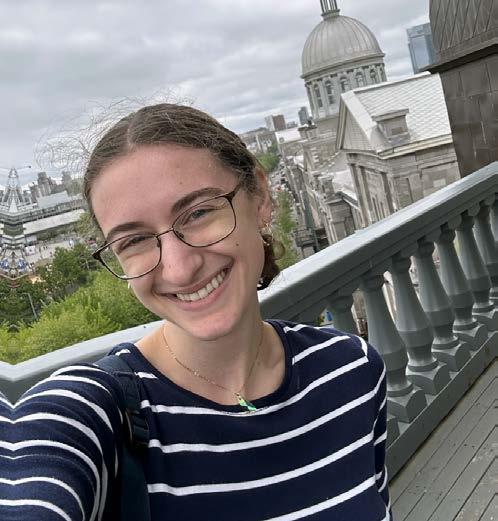
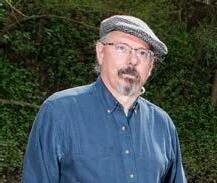
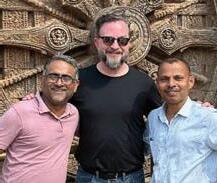
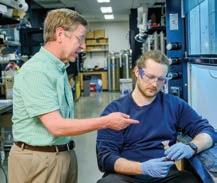
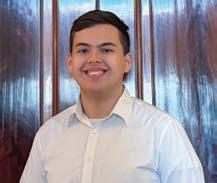
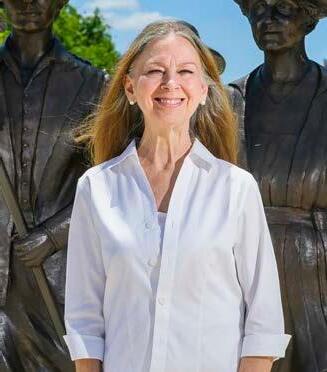


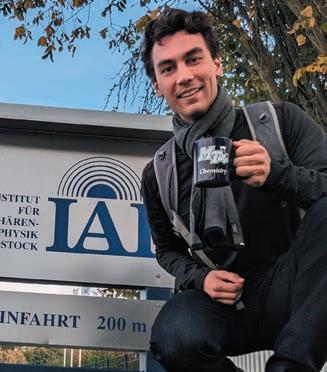
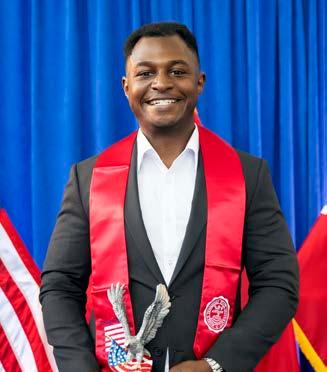






Liberty Mutual Insurance has an ad in which an emu leaves the ranch to pursue his passion. One of his ranchers, who viewed him simply as a “flightless bird,” is later startled to learn of his success. We know that our own students have wings and can fly high, and we take pride in another year of student success, faculty achievement, Board of Visitors engagement, and continued alumni accomplishments and support.
Nationally, the educational landscape remains uncertain, with greater governmental oversight and intrusion into educational policies, and federal cutbacks. Such cuts continue to leave students and faculty members uncertain as to whether grants they have received, or anticipate seeking, for study abroad, foreign language training, and research will be funded. This year our students have won Fulbright, Gilman, Goldwater, Japanese Exchange and Teaching (JET), and other prestigious awards, and our Undergraduate Fellowships Office continues to seek nongovernmental funding opportunities.
The Honors College has successfully recruited new classes of Buchanan freshmen and Buchanan transfer students. Honors students won all four of the University’s top awards—President’s, Provost’s, Community Service, and Robert LaLance recognitions— as well as several others, and our graduates are off to a number of prestigious graduate and professional schools and exciting jobs.
As we begin a new year, Amy Sayward of the History Department has begun leading the American Democracy Project, which is housed within the Honors College, following the retirement of Mary Evins, another MTSU historian who brought this project into national prominence. Nancy Prescott, who recently earned her master’s in Public History and received one of the statewide Harold Love Awards for community service (along with Honors resident faculty member Dianna Rust), is the new Honors student engagement coordinator.
With support from the Honors College and our board member Jeff Whorley, students were able to hear former Vice President Mike Pence speak at the 2024 Constitution Day celebration, and New York Times
columnist David Brooks served as our guest this year. As a political scientist, I am particularly looking forward to engaging students in the celebration of the nation’s semiquincentennial in 2026.
Our graduates are off to a number of prestigious graduate and professional schools and exciting jobs.
Associate Dean Philip E. Phillips and I, as well as our resident faculty members, continue our scholarly research, publications, and presentations, and we were pleased to host the Tennessee Collegiate Honors Council 2025 meeting. The Honors College continues to support the Phi Kappa Phi (Dr. Phillips is the national president-elect) and Omicron Delta Kappa honor societies. We also support MTSU’s Institute of Leadership Excellence each summer.
Although Areté magazine is now only printed once a year, we regularly post articles on social media and began a podcast this fall. We encourage you to follow our students’ progress. You may also enjoy checking out our Collage literary magazine online. Watch us, and support our campaign for an Honors Excellence Endowment, as we fly to new heights

John
R. Vile
Dean, Honors College

Follow us on social!
noun (ahr-i-tey) the aggregate of qualities, as valor and virtue, making up good character




By Robin E. Lee
For Army veteran and MTSU Honors student John Farris, service didn’t end when he left the military. Whether working toward his Aerospace degree, training service dogs, or helping fellow student veterans, Farris has found ways to carry his dedication to others into every corner of his life.
“John has demonstrated and upholds the highest tradition of ‘service before self’ that servant leaders— including future airline captains—must possess to be effective leaders,” said Peter Neff, an associate professor in MTSU’s Aerospace Department.
A Tennessee native, Farris graduated from Columbia Academy at just 17 years old. By the time many people his age entered college, Farris was completing basic training and preparing to serve as a radio transmitter operator at Joint Base Lewis-McChord in Washington state. Though his dream had always been to become a pilot, the contract requirements for military aviation didn’t align with his plans.
After leaving the Army in 2021, Farris made the decision to return home and pursue aviation through higher education.
“I chose MTSU because of the Aerospace Department and because I wanted to be a pilot,” Farris said. “MTSU is also quite close to home, which was a big part of my decision.”
Now pursuing MTSU’s Professional Pilot pathway, Farris has maintained a 4.0 GPA while also completing his Honors thesis titled “AI in Academia: The Next Evolution of Human Thinking and Learning.”
“His research addresses the mixed messages students face when AI policies are left to individual faculty members rather than being guided by a clear institutional framework,” said Tara Perrin, Farris’ thesis advisor and an MTSU Online instructional designer. “John’s work explores how faculty can thoughtfully incorporate AI into the classroom without compromising core elements like pedagogy and the development of critical thinking skills.”
Perrin praised Farris’ thoughtful feedback approach and dedication to making meaningful impact through his research.
“One of the strengths I’ve noticed in our short time working together is his ability to handle critique, reflect, and thoughtfully adapt or defend his ideas,” she said. “Through this project, John hopes to support students who see AI as a tool to enhance—not replace— their learning. By examining policy gaps and faculty perspectives, he aims to offer recommendations that
benefit his peers both during their time at MTSU and in their future careers.”
Joe Hawkins, an Aerospace associate professor, sees firsthand how John Farris’ military background shapes his approach to academics and career goals.
“John’s military experience has given him a strong sense of discipline, attention to detail, and adaptability—traits essential in aviation and academia,” Hawkins said. “He applies a methodical mindset to complex technical subjects, demonstrating a commitment to excellence that aligns with the high standards expected in the aerospace industry.”
John’s military experience has given him a strong sense of discipline, attention to detail, and adaptability.
Hawkins also praised Farris’ leadership skills, noting his professionalism and confidence, especially when working with peers or engaging with faculty. His ability to stay calm under pressure and manage time effectively has been instrumental in helping him balance the demanding coursework and flight training required in the program.
Hawkins emphasized the importance of traits such as discipline, communication, and teamwork, which Farris has cultivated throughout his military service.
“John’s perseverance is a testament to the strength and dedication that make veteran students such an asset to MTSU’s community,” he added. “Veterans like John bring a deep sense of responsibility, not just to their education, but to their families and communities as well.”
According to Hawkins, Farris’ example reflects how veterans, despite facing significant personal commitments, excel in MTSU’s rigorous programs while supporting others and enriching the learning environment with their unique perspectives and experiences.
With graduation planned for next May, Farris is looking ahead to the next chapter—whether it’s instructing future pilots at MTSU’s flight school or

pursuing commercial aviation opportunities with programs like Southwest Airlines’ Destination 225° or Delta Air Lines’ Propel.
“The Aerospace program is constantly pushing and evolving their students to succeed in aspects of aviation,” Farris said. “I am very fortunate to be a part of this program and hope one day to instruct at the MTSU flight school.”
Farris’ ambitions also stretch beyond the cockpit. For over a year, he has been training Ellie, a German shepherd, to become a seizure-alert service dog for individuals with epilepsy. This is the fifth dog he has trained—what began as fostering through the Middle Tennessee German Shepherd Rescue grew into a calling.
“Ellie was very timid at first, but she had high energy and strong social skills,” Farris said. “I realized she could make a great companion animal and decided to focus her training on seizure alerts.”
Over the course of 20 weeks, Farris worked with Ellie on specialized responses, including recognizing seizure activity, signaling for help, and remaining calm in public spaces. It’s a challenging process, but one Farris finds deeply rewarding.
In fact, the first dog he trained, Hans, was for his father. When his dad’s health began to decline, Farris took on the responsibility of caring for both him and Hans, managing the dog’s training to provide stability and companionship during difficult times.

“Hans was very special, not just to my dad but to our entire family,” Farris recalled. “He was incredibly well-trained and could be taken anywhere, anytime. Helping to care for him, especially while supporting my father, gave me a deeper appreciation for the bond between people and their service animals.”
The only way to find that kind of fulfillment is to push yourself, look for opportunities, and strive to help others.
During this period, Farris was balancing an intense schedule that would be overwhelming for most. He juggled a demanding academic load at MTSU— including 18 credit hours and a rigorous flight lab— while working 24 hours a week as a patrol officer on campus and training Hans while serving as his father’s primary caregiver.
“It was very difficult, and I’m proud of myself to have made it through that time,” he said. “Trying to keep up with school, work, and caring for my dad felt like a constant uphill battle, but I knew I couldn’t drop the ball on any of it.”
Although Hans has since passed away, Farris reflects on that season of his life as one that shaped his dedication to helping others through dog training.
“I knew I wanted to continue working with dogs, not just for my own healing, but to help others find the same comfort and support that my dad found,” he said.
“I’ve always wanted to help others, and extending my skills to help others with their animals has been a very rewarding experience. When Ellie is ready and passes her Public Access Test, I know it will all be worth it to help someone in need.”
That commitment to service extends to his work with other veterans on campus. Like many who leave the military, Farris faced an uphill climb transitioning into civilian and academic life. He credits MTSU’s Charlie and Hazel Daniels Veterans and Military Family Center with making that process smoother.
“The Daniels Center has been instrumental in my transition, as well as the many veterans on campus and the groups I’ve been fortunate to be a part of,” Farris said. “Money was very tight for me the first two years, and without the Daniels Center, I wouldn’t have been able to afford to go to school. They helped me with scholarships, grants, and so much more.”
Daniels Center Director Hilary Miller says Farris’ story represents exactly why the center exists.
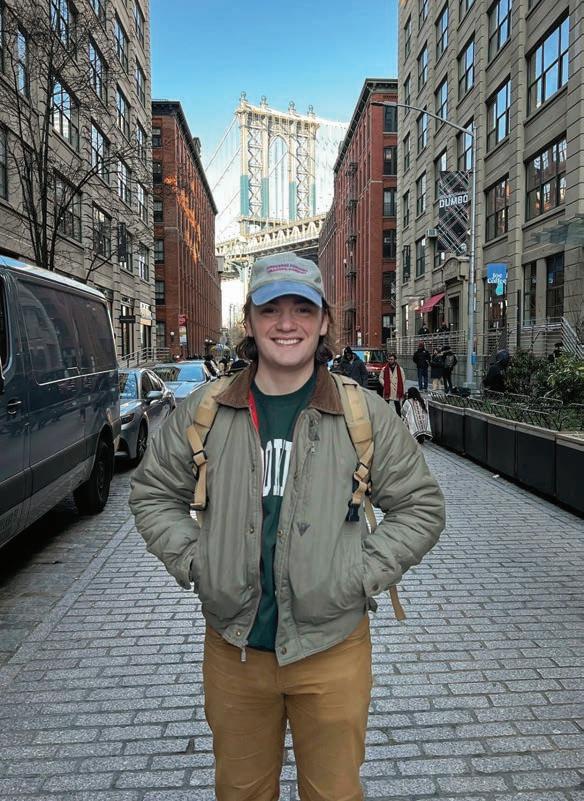
“The Daniels Center understands that militaryconnected people are hardwired to serve,” Miller said. “If they are not doing something purposeful, they are going to feel at a loss. It is our privilege to help reconnect them to purpose.”
For Farris, that sense of purpose now takes many forms—flying, training dogs, helping friends with their own service animals, and mentoring other student veterans.
“Fulfillment won’t come out of accomplishing one specific thing,” Farris said. “It’s about continually working on yourself and those around you. The only way to find that kind of fulfillment is to push yourself, look for opportunities, and strive to help others.”
As he looks toward his future in aviation, Farris hopes his journey encourages other veterans to take advantage of all MTSU offers.
“Go for it,” he said. “There’s nothing stopping you from being a great student and part of the community. This has been the best time of my life—the Daniels Center, the Honors College, the Department of Aerospace—all have changed me to be a better person and a contributor to the community.”
And as for Ellie? With Farris’ guidance, she’s well on her way to changing someone’s life too.
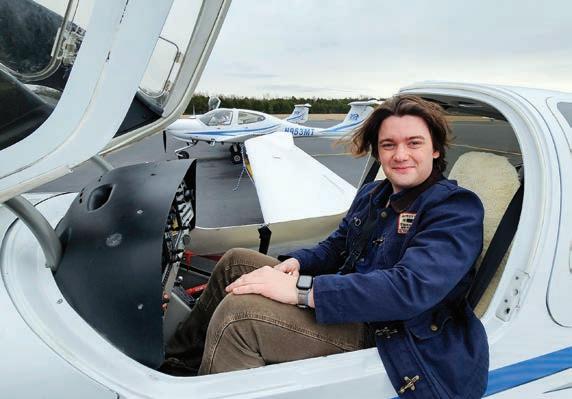

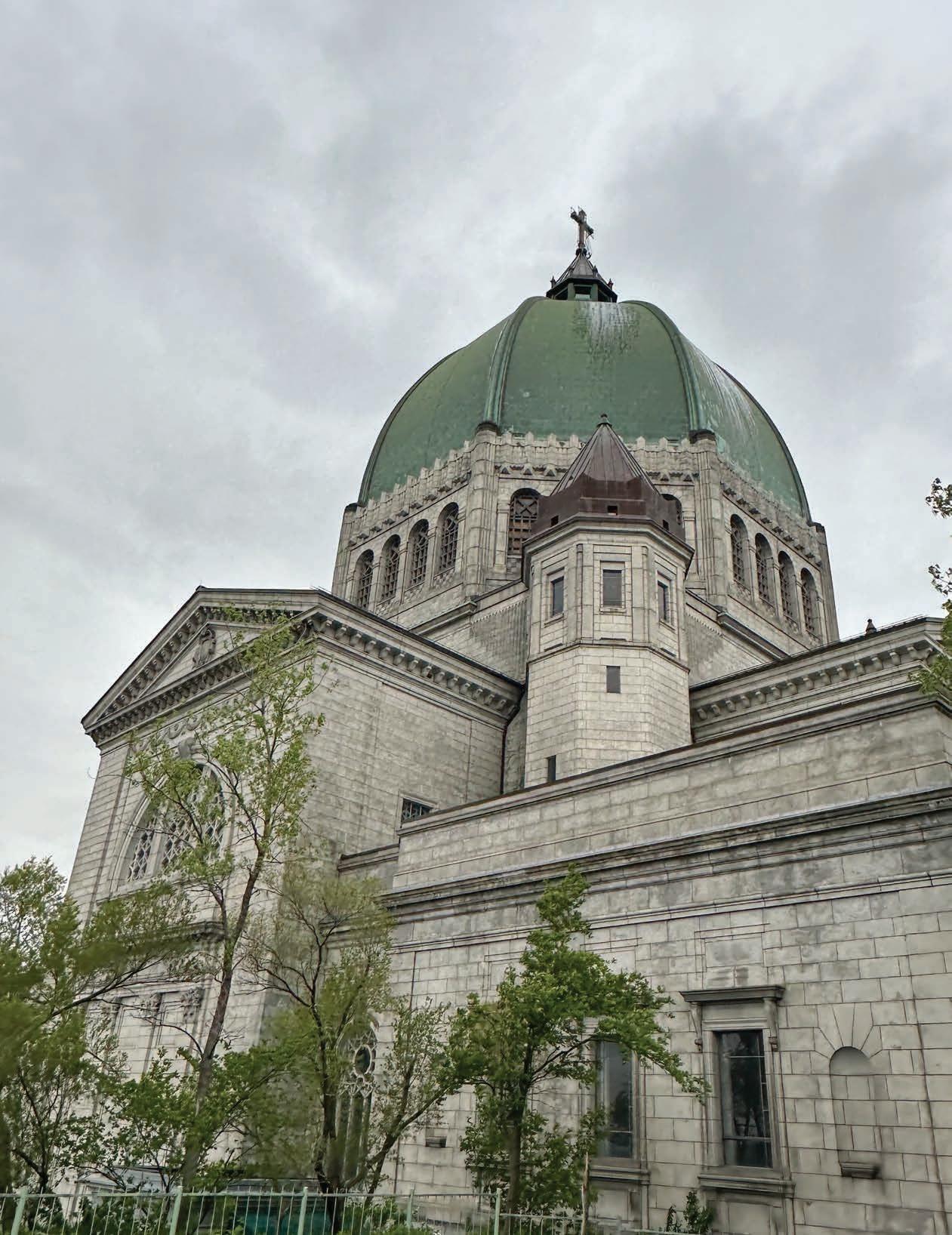
By Ariel Nicastro
When I first signed up for a study abroad program on religious diversity, I knew it would be different from anything I’d done before. As a Physics major, I’ve spent much of my undergraduate career immersed in problem sets, research, and approaching the world through a scientific lens.
For 10 jam-packed days in May, however, I swapped the lab for temples and new perspectives.
Organized by Honors faculty member Rebekkah King with lectures by Brian Carwana from the Encounter World Religions Centre, the Religious Diversity in Toronto and Montreal study abroad program combined lectures, site visits, and cultural exploration to deepen our understanding of how religion is practiced and experienced across different communities.
Each day in Toronto was intense in the best way: starting with breakfast at 7:20 a.m., followed by a rotation of lectures and three to four site visits that sometimes didn’t end until nearly 9 p.m. I feel like I learned as much in those four days as I would in an entire semester!
My classmates were all Religious Studies majors or minors, and I was the only student with a major in STEM (science, technology, engineering, and mathematics). I wasn’t sure what to expect from the group dynamic or


how I would fit in, but I found my place quickly. Everyone was welcoming, open, and eager to talk about what we were learning. We spent our free time together exploring the city, trying new foods, and developing countless inside jokes.
Each visit gave us something new to think about and offered a chance to step briefly into someone else’s world.
One memorable moment was when we got cultureshocked by the word “washrooms,” which are what we often call restrooms. What started as a group of classmates quickly became a group of friends. Even though our academic backgrounds were different, we shared a curiosity and enthusiasm for learning that
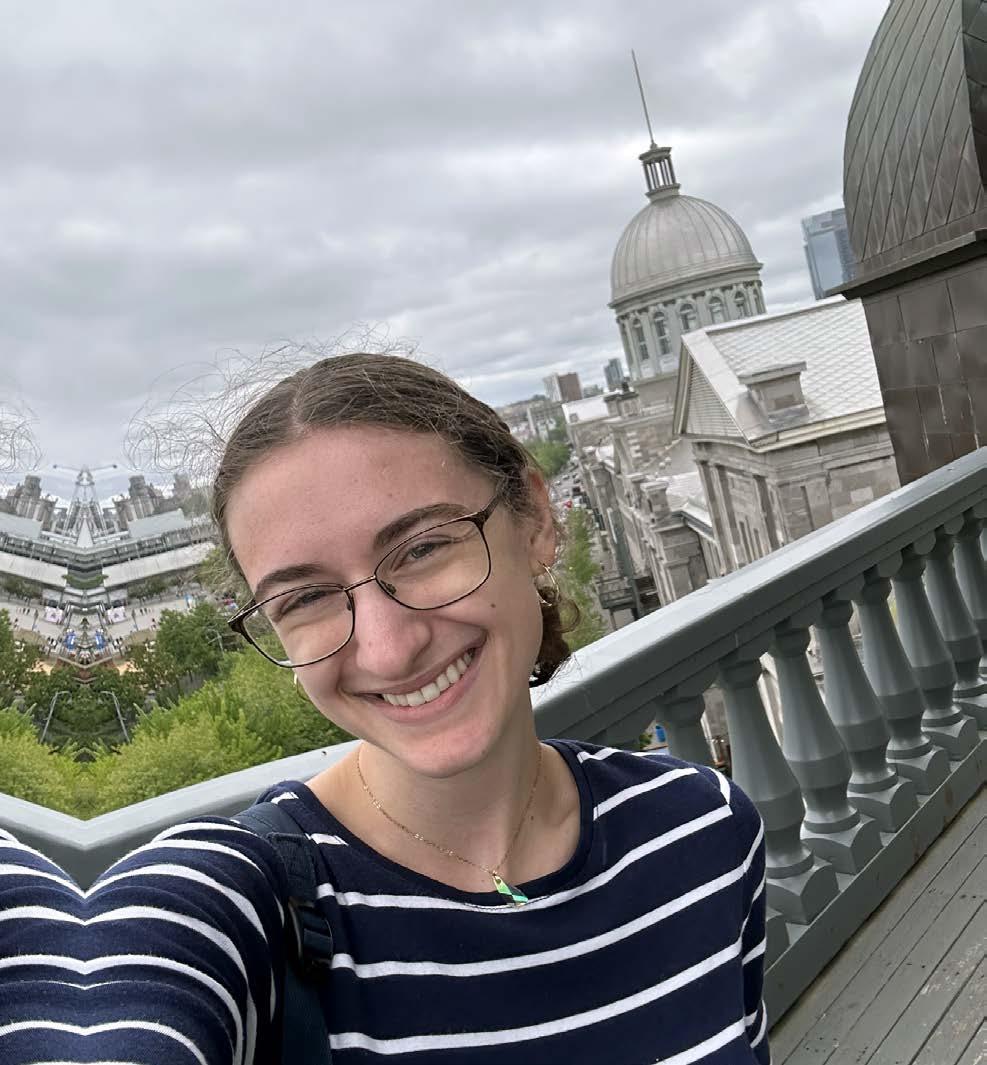

We sat cross-legged on the floor of a Sikh Gurdwara and shared a langar meal with everyone in the community, which symbolizes the Sikh beliefs of serving others and the personal rejection of prejudice. In a Hindu temple, I was engulfed in unique sights, sounds, and smells: music, bells, incense, and bright colors. Each deity was honored with a beautifully decorated shrine. We danced at a Hare Krishna temple, practiced tai chi during a Daoist visit, and stepped into a wide range of sacred spaces: Muslim, Jewish, Christian, Buddhist, and Zoroastrian.
Each visit gave us something new to think about and offered a chance to step briefly into someone else’s world.
After five and a half eventful days in Toronto, we traveled to Montreal, where religion was experienced a little differently. The city’s deep Catholic roots are reflected in its history, layout, and architecture. We visited churches, attended services in French, and explored museums about the religious and Indigenous history of Quebec.
My favorite memory from Montreal was strolling down an old street lined with tall, cream-colored buildings. As the church bells from the Notre Dame Basilica rang out, it felt like walking through a town I had only ever imagined.
Much of our conversation about religion in Quebec centered around laïcité, a form of secularism unique to the region that seeks to separate religion from public life. While Toronto highlighted lived and active practice,


Montreal showed how history, identity, and policy can shape religious experience in quieter yet lasting ways.
Of course, it wasn’t all study and site visits. We made time to explore too, enjoying Ethiopian food during our first evening in Canada, sampling dishes from Toronto’s Chinatown, comparing poutine in both cities (Montreal wins), and visiting the CN Tower—which I was especially excited about since I collect miniature towers.
I even got to practice my French while ordering food in Montreal. Those smaller moments, shared with people I had only just met, ended up meaning just as much as the formal lessons.
Looking back, this trip gave me more than just academic knowledge. It challenged me to think differently, listen more carefully, and stay curious. Thanks to funding from the Gilman Scholarship and the guidance of Dr. King, I had the opportunity to step into a field far outside my usual comfort zone. I came home feeling more thoughtful, more connected, and more aware of how much I still have to learn about the world around me.
And, maybe most importantly, I was reminded that meaningful learning doesn’t always happen in a classroom. Sometimes, it happens on the floor of a temple, around a shared meal, or in conversation with someone whose experiences are entirely different from your own. I would recommend an MTSU study abroad trip to anyone looking to challenge their perspective, build new connections, and learn in ways that textbooks simply can’t offer.
By Maddy Williams
In the wake of a tragic student death on campus, organizers of MTSU’s first conference in recognition of National Disability Employment Awareness Month (NDEAM) decided to move forward with the event, with speakers emphasizing the critical importance of discussing mental health and disabilities.
The new conference last October was the brainchild of Buchanan Transfer Fellow Kia Dowen, a first-generation college student and a senior Media Management major. Dowen is also chapter president of the Omicron Delta Kappa and Gold Key International honor societies, two of the event sponsors along with the Honors College and Provost’s Office.
Classes had been canceled the day of the conference as the campus community tried to cope with the tragic death of student Serenity Birdsong by suicide in James E. Walker Library.
“All of our speakers are geared toward speaking specifically on their experiences with disabilities and their leadership. . . . We will also use this as a way to help the campus grieve,” Dowen said during opening remarks. “It’ll be part of our processing of this event, and so our speakers will put a somewhat heavier focus on the mental health aspect.”
MTSU student Jaden Keith, 21, a Music major from Missouri who originally planned to attend the event with his Communication class, decided to go on his own following the tragedy. Keith said it’s important to celebrate NDEAM because “it affects us in more ways than we know, and it’s definitely informative to know how it affects everyone involved.”
The conference featured six guest speakers who shared their professional and personal journeys coping with mental and/or physical disabilities, aiming to shape the audience’s perspectives on success, leadership, and ability in the workplace.

• Meaghan Thomas, event master of ceremony and a meteorologist at WBRC-TV in Birmingham, Alabama, briefly spoke about her nonprofit, The Heart of Hearing, which raises funding for those who cannot afford hearing aids.
• Gerald Christian, associate director of MTSU’s Disability and Access Center, shared his story of becoming paralyzed after a car wreck as a teenager and how he overcame the difficulties that his disability brought.
• Shari Hinton, a Nashville native who works for the Office of Protection Services for the Smithsonian Institute, discussed how she overcame a number of personal challenges, including bipolar disorder, and now champions vulnerable populations.
• MTSU Psychology graduate student Joe Adams said he began transforming his life after struggling with drug addiction, but then began struggling with a new addiction—the addiction to success.
• J.P. Williams, a hit songwriter, performer, executive coach, and motivational speaker who lost his vision at age 10, is a now a life coach and founder of the publishing company Blonde Leading Blind Music.
• Eric Zink, one of social media’s largest mental health and addiction advocate educators, attempted to take his own life after losing both his wife and father to suicide and discussed the importance of talking about mental health.
One of the biggest takeaways for MTSU student Hunter Warren was bringing “awareness to different types of disabilities and, like they said, invisible disabilities.”
Added Keith: “Even though it may not look like someone has a disability, it definitely affects more people than you know and in more ways than you probably know.”


By Jorge F. Avila

During the fall 2024 election season, I had the incredible opportunity to intern with the Democratic National Committee (DNC) through The Washington Center (TWC) Experience. This transformative program combines professional internships, academic coursework, and career preparation in the heart of Washington, D.C.
While taking a Security and Peace in International Relations class and attending TWC-led workshops and networking events, I began building the foundation for my future political career. My primary internship placement was with the DNC’s States Department, where I played a direct role in shaping election efforts across the country.
At the DNC, my work included tracking hundreds of federal and down-ballot races across the U.S., writing memos for distribution to the White House, recording voting deadlines for all 50 states, phone banking, and volunteering for door-to-door canvassing efforts. I also
had the unique responsibility of announcing live election results to White House officials—a task that underscored the high-stakes environment I was operating in.
One of the most memorable moments of my internship came on Election Day, when I helped prepare the DNC headquarters for a surprise visit from presidential candidate and Vice President Kamala Harris. I worked with a team of interns to ensure a phone-banking event went smoothly and witnessed the vice president up close—an experience I’ll never forget.
That same day, I helped report live election results to government officials, navigating a high-pressure atmosphere with focus and professionalism. It was chaotic, fast-paced, and absolutely exhilarating. That day, I realized how much I had grown in confidence and capability.

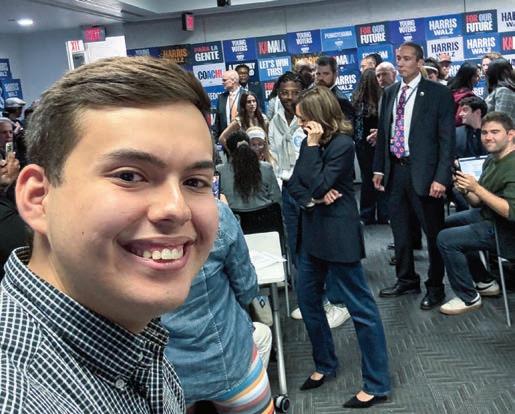
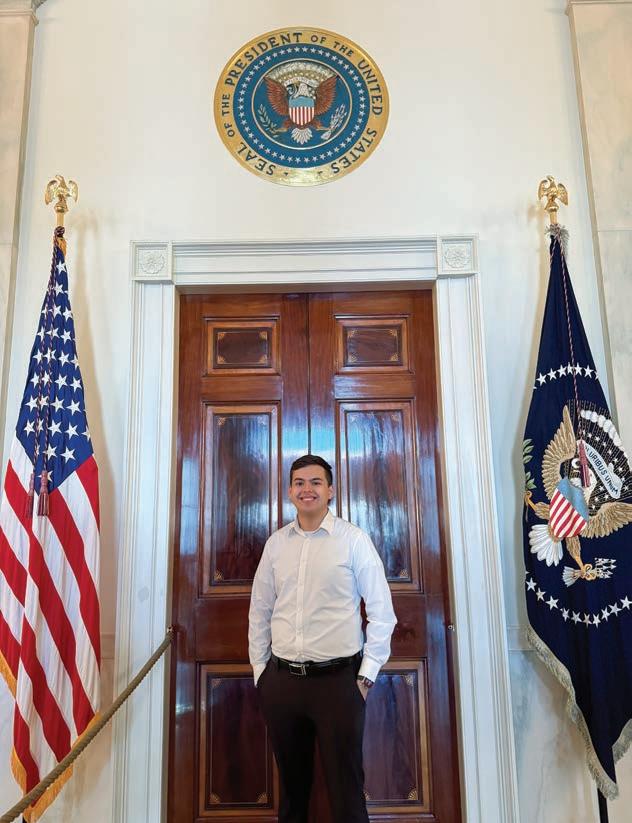
Following the end of my DNC contract on Nov. 15, I began a short-term internship with Bold PAC, the political arm of the Congressional Hispanic Caucus. There, I helped organize events for members of Congress and lobbyists, conducted detailed research for Bold PAC legislative members, met with congressional staff, and toured the U.S. Capitol—including the House floor itself.
Beyond the professional sphere, I made the most of my time in D.C. I visited iconic monuments and museums, including the Smithsonian National Museum of Natural History and the Dulles Air and Space Museum. I even caught a D.C. United pro soccer match against the Columbus Crew.
Coming from the moderately sized city of Murfreesboro, I was initially nervous about living in a bustling metropolis like Washington, D.C. The Metro system and pace of city life were unfamiliar to me. But with preparation and persistence, I adapted quickly, and soon I was navigating the nation’s capital like a local.
This internship experience has deeply influenced my career trajectory. Working at the DNC during an election
year reaffirmed my passion for civic engagement and inspired me to pursue a future in law and politics. I am considering applying to law school in Washington, D.C., a city that has captured my heart.
I am considering applying to law school in Washington, D.C., a city that has captured my heart.
Since returning to MTSU, I’ve noticed a renewed sense of confidence. I’ve become a stronger public speaker, more engaged in class discussions, and more connected with faculty and peers. I’m grateful to The Washington Center for opening the door to such a life-changing opportunity, and I strongly encourage other students to apply—it might just change your life the way it changed mine.
First-generation student latest at MTSU to strike Goldwater
By Robin E. Lee
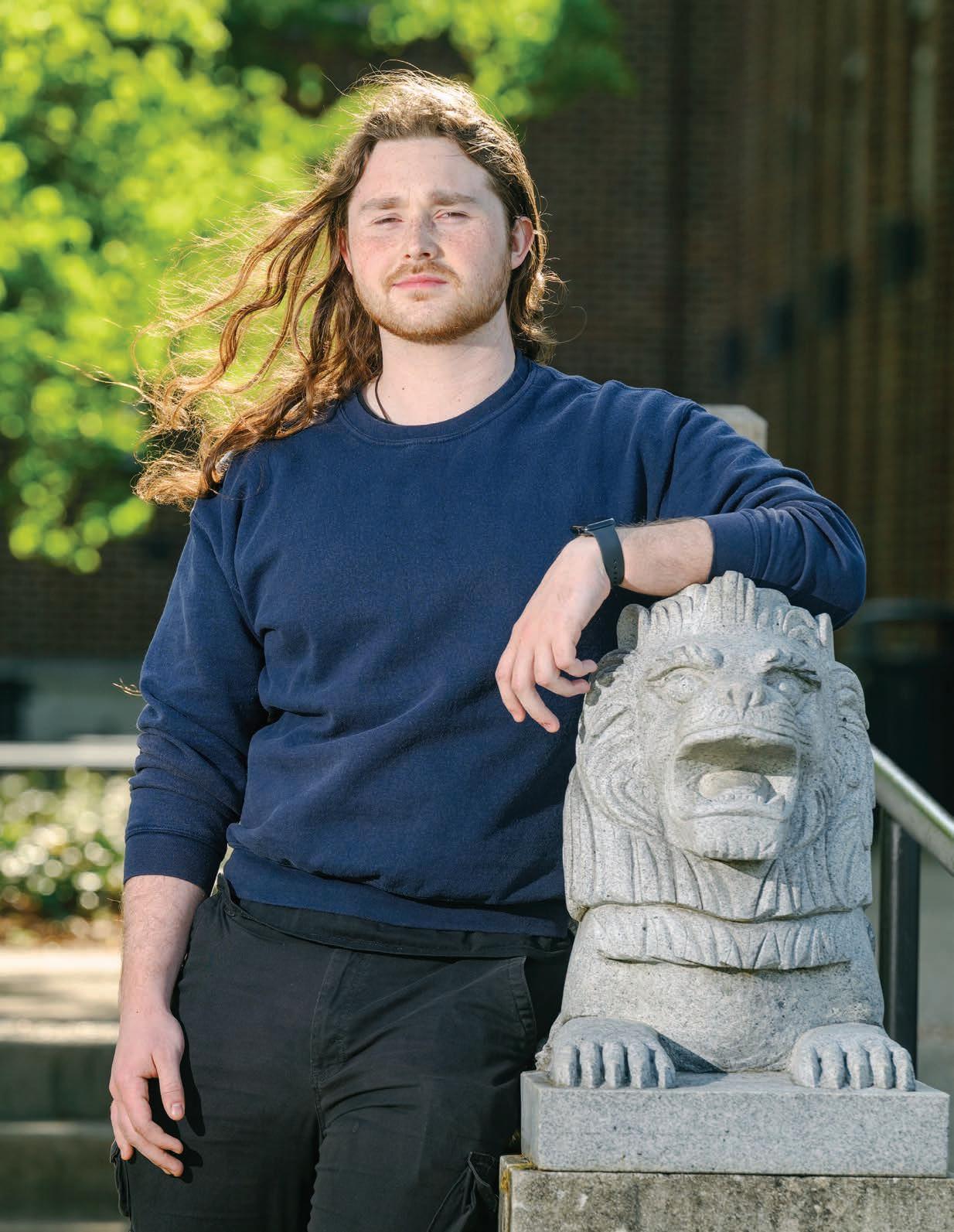
Isaac has a rare combination of incredible talent and ability, coupled with a drive to do his absolute best.
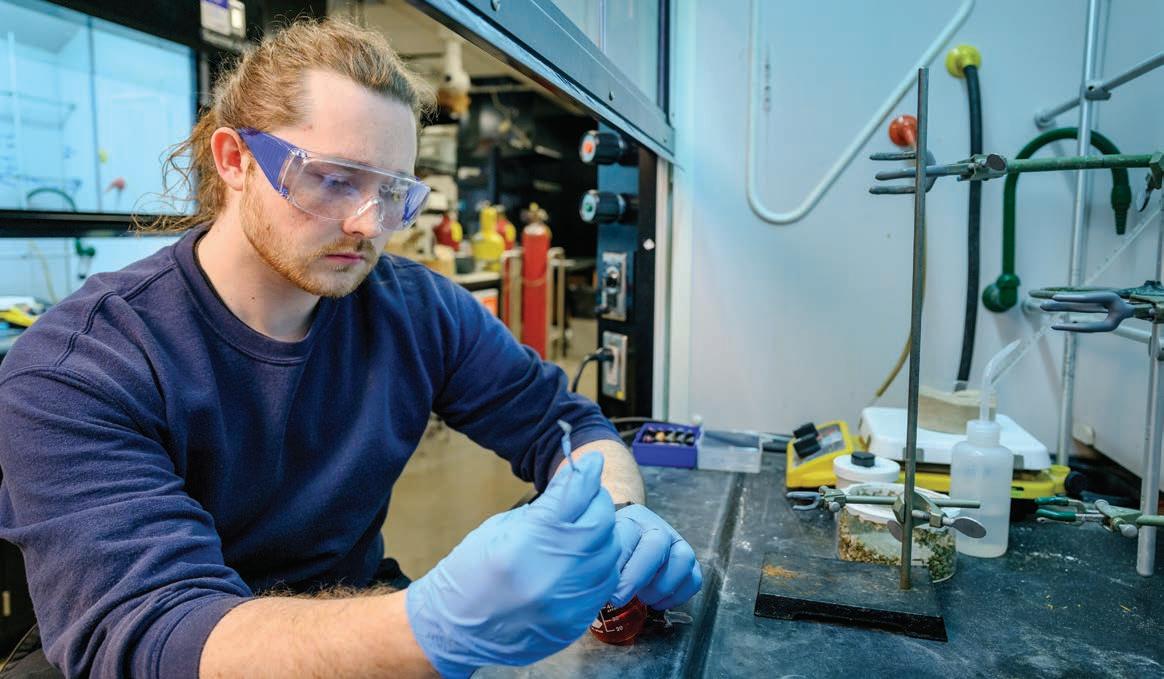
Through extensive research as an undergraduate at MTSU, Isaac Puckett has excelled to the point that he recently earned a nationally competitive Barry Goldwater Scholarship. He also participated in the Memorial Sloan Kettering Cancer Center’s prestigious Chemical Biology Summer Program in New York City in 2025.
Puckett, an Honors student and Biochemistry major, ranks among only 441 students selected across the country for the Goldwater Scholarship, which recognizes the nation’s most promising students in science, engineering, and mathematics.
His journey has not been without challenges, either. As a first-generation student from a disadvantaged background, Puckett has overcome obstacles to pursue his studies and extracurricular research. He believes his personal story and dedication to scientific discovery made his application stand out.
“He has balanced academic excellence with extensive employment responsibilities,” said Laura Clippard, Honors advisor and undergraduate fellowships specialist, who helped Puckett with his application.
“His perspective and adaptability have driven his success and fueled his aspiration to lead impactful cancer research that contributes to human health and advances scientific understanding.”
Puckett is MTSU’s seventh consecutive Goldwater recipient and its 12th since the first in 2007, while eight students additionally have received honorable mention.
“Isaac has a rare combination of incredible talent and ability, coupled with a drive to do his absolute best at anything he does,” said Scott Handy, a Chemistry professor and Puckett’s research mentor.
“He never does things just to add a line to a resume— he does them because they mean something and have value to him. His curiosity goes beyond memorizing facts; he genuinely wants to understand the ‘whys’ behind his work.”
Puckett’s research focuses on novel fluorescent probes and the Knoevenagel condensation reaction, a field with significant biological and cancer research applications.
“My research has been crucial in forming my goal of pursuing organic synthesis further,” Puckett said. “It has shown me how applicative the research is toward other fields, particularly cancer.”
Winning the Goldwater Scholarship is a milestone that will support Puckett’s continued research and academic endeavors. Puckett, from Whites Creek, will receive up to $7,500 per academic year to assist with tuition, fees, books, and room and board. Established by Congress in 1986 in honor of late Sen. Barry Goldwater, the scholarship is the premier undergraduate award for students aspiring to research careers in STEM disciplines.
Beyond his research, Puckett has actively contributed to the academic community through leadership and mentoring in organizations such as the Student

Organization for the Advancement of Research (SOAR), Undergraduate Research Experience and Creative Activity (URECA), and the Undergraduate Experiential Training (U*NEXT) program.
These experiences, he notes, have not only deepened his research skills but also connected him with invaluable mentors, such as April Weissmiller, a Biology assistant professor. Puckett says her program prepared him to be a scientist able to collaborate with others and pursue opportunities like the Goldwater.
“I am very impressed by Isaac across many areas: his intellectual ability, work ethic, and drive to pursue his goals,” Weissmiller said. “He is a shining example of how someone can come from an underrepresented background with little family guidance yet achieve great things as he learns from all the mentors that invest into his life.”
Jamie Burriss, director of MTSU’s Undergraduate Research Center, also highlighted Puckett’s impressive track record in securing funding and supporting fellow students in research.
“Isaac has been awarded three URECA grants, which is a true testament to his skill in crafting clear, well-structured proposals, executing projects efficiently, and meeting the expectations set by faculty,” Burriss said. “He has been instrumental in the publication and promotion of our Research Groups and Labs Directory, which has been essential to increasing opportunities for
students to get involved in research and being successful in research endeavors.”
Puckett encourages other MTSU students to consider applying for the Goldwater Scholarship and to pursue opportunities that genuinely excite them.
“Motivation is the key component to pursuing and winning any opportunity,” he said. “Research and pursue a topic that challenges and inspires you to keep learning.”
The next cycle for the Goldwater Scholarship opens this September and runs through January 2026. Interested MTSU students should begin planning early, working with mentors and campus advisors to develop a strong application.
“Isaac’s progression from closely guided student to independent researcher has exceeded my expectations. He is already operating at a level that will give him a significant advantage in graduate school,” Handy said. “His recognition as a Goldwater Scholar affirms that MTSU’s best students are as capable as those from top-tier institutions.”
Puckett’s recognition as a 2025 Goldwater Scholar highlights the strength of MTSU’s research programs and the University’s ability to prepare students for competitive national awards. As he continues his academic and professional journey, Puckett exemplifies the next generation of leaders in the natural sciences.
Visit goldwaterscholarship.gov or email laura.clippard@mtsu.edu. A
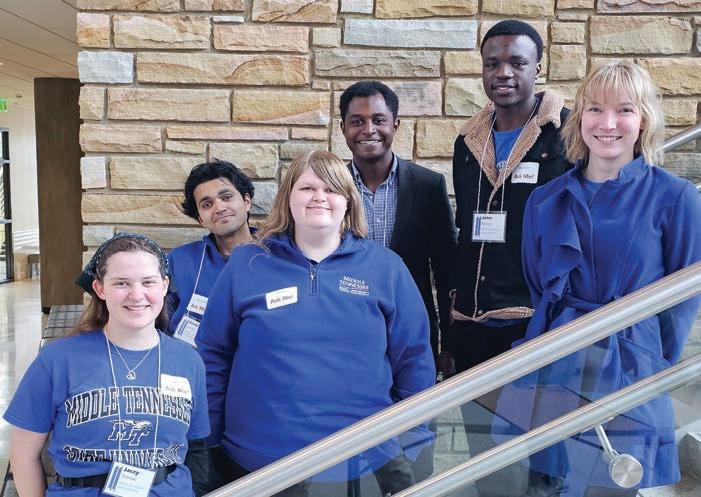
More than 100 Honors students from 17 institutions across the state gathered at MTSU for the 2025 Tennessee Collegiate Honors Council (TCHC) annual conference in the spring.
This year’s conference theme, “Pillars of Excellence,” reflected the values of strength, reliability, and exceptional performance. This theme underscored the idea of foundational support systems that foster success and high standards.
“The theme resonated with me because of the activities I engage with in and out of the classroom,” said Hannah Antrican, a Psychology and Sociology major and president of MTSU’s Student Organization for the Advancement of Research (SOAR). “At the conference, I was inspired to reflect on how my engagement with the Honors College has contributed to my personal development in all these areas.”
Honors Dean John R. Vile and MTSU Provost Mark Byrnes, an MTSU Honors alumnus and former Honors faculty member, welcomed participants to the two-day conference.
“Honors faculty and students continue their pursuit of scholarly excellence in community settings that prepare them for continuing service to their respective institutions and the community,” Vile said.
Honors students spent months developing scholarly papers and posters to present, giving them the opportunity to share their research findings, receive valuable feedback, and practice professional
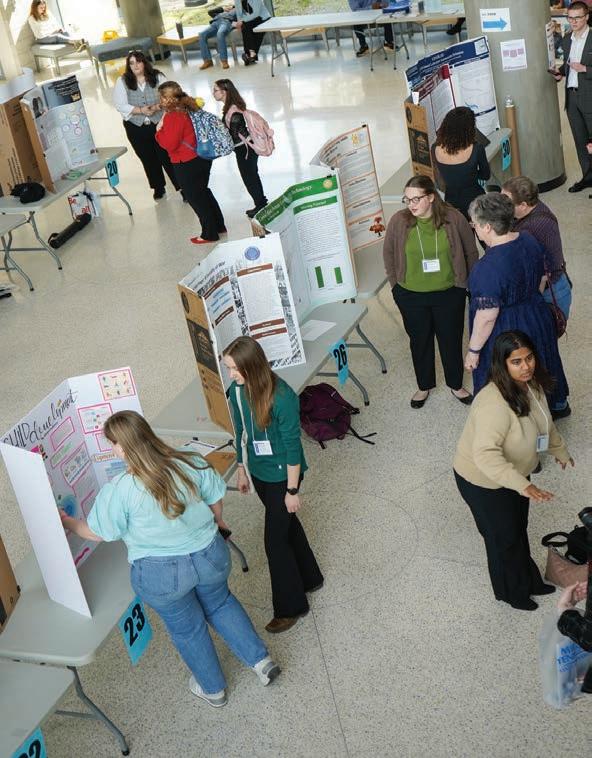
communication skills. These activities contribute to their academic growth and future career development.
“The TCHC conference was a wonderful experience for me, especially as a freshman primarily surrounded by seniors presenting their Honors theses,” MTSU Aerospace major Sam Haley said. “It perfectly demonstrated the jump in academia from senior year in high school and my AP Research project to an elaborate Honors thesis.
“It’s definitely changed my perspective on being a part of the Honors community—I look forward to hopefully being able to present my senior year as well and can’t wait to see where my journey in this community takes me.”
The conference also featured an essay contest, and attendees gathered for a social event on Friday evening at the Paul W. Martin Sr. Honors College Building. Saturday featured a Fellowship Roundtable led by Laura Clippard, MTSU’s undergraduate fellowships specialist and Honors advisor, and Trey Straussberger, director of the Office of National Scholarships at the University of Tennessee–Chattanooga. Featured panelists for the discussion were Honors Buchanan Fellows Samuel Apigian (’25), a May graduate in Mechatronics Engineering, and Victoria Grigsby, a dual Political Science and Foreign Languages (German) major, along with MTSU Honors graduate Tandra Martin (’15), now senior associate consultant of higher education strategy and operations at Huron Consulting Group.
Collage: A Journal of Creative Expression, an MTSU outlet since 1968 that moved under Honors auspices in 2005, publishes about 60 pieces of work every semester from around 350 blind submissions. Creative Expression Awards are given each edition to top-ranked poetry and prose (named in honor of Martha Hixon), photography and artwork (in memory of Lon Nuell), and sometimes audio, video, and/ or song lyrics. Collage was recently awarded first place in the 2025 National Collegiate Honors Council Publications Contest for the Student Published Division Journal Category.
View issues at collage.mtsu.edu
Poetry
Emilee Vecchio
"Love or Loss"
Prose
Katie Olexy
“Dead or Alive?”
Art Jess Hayes
Plexus
Photography Vega Rochat
Neon Nights
Video Lucas De Freitas Our Heart’s Silent Rapture


“Saints in the River, Mourning” by Harley Mercadal
Kingsport smells of capitalism—the paper mill, Eastman, craft breweries, and Pal’s hotdogs—so the goose-shit smell complements my dread when we cross the swinging bridge Nellie Pratt left to empty a particularly small, red box.
Brianne palms our father’s ashes into the Holston River; similarly, my grief and relief mix into clouded brown waters. I want to submerge my face, open my eyes, see if there are saints in this river—maybe ghosts—or simple morbidity.
Do I have any last words? No; nothing appropriate, anyway. My sister soaks in her mourning like her roll-cuffed jeans, and I, dry-eyed at the water’s edge, wonder if river-fish eat bones. We watch our father wash away, and alone, I don’t look back.
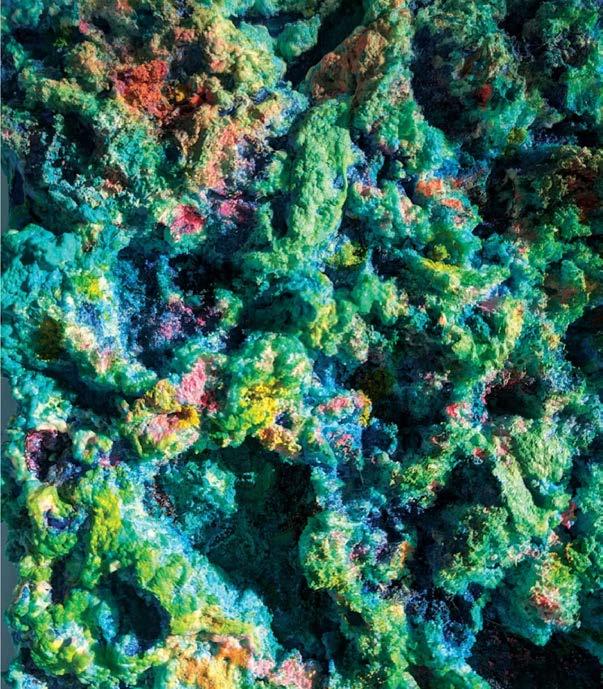
Poetry
Harley Mercadal "Saints in the River, Mourning"
Prose
Katie Olexy “I Came Out of the Womb Singing”
Art Aliyah Shuman Ode to 2619
Photography
LaAsia Harris
Desolate Jay
Audio
Alex Tumbleson “Philadelphia”


“Philadelphia” by Alex Tumbelson



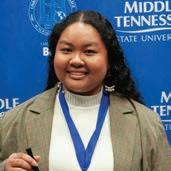
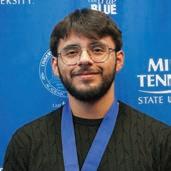

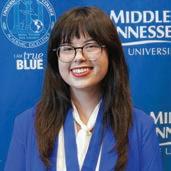
Lauren Tyler Art
“A Creative Exploration of Hyper Femininity as a Rejection of the Male Gaze”
Mark McLeod, thesis advisor


Malak Abdelrahman
Biochemistry
“The Effects of Antibiotic-Oxytocin Interactions on Social and Motivational Behavior”
Tiffany Rogers, thesis advisor
Katrina Aguilar
Political Science
“The Rhetoric of Restriction: A Content Analysis of Voter Identification Laws in Local News and Political Discourse in Tennessee”
Kent Syler, thesis advisor
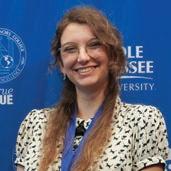

Carlos Aldana Lira
Computer Science
“Qualifying Novices’ Conceptual Resources in Computer Science I”
Tasha Frick, thesis advisor

Eden Anderson
Biochemistry
“Detecting Estrogen Pollution in the Stones River Waterways using the Yeast Estrogen Screen (YES)”
Rebecca Seipelt-Thiemann, thesis advisor
Samuel Apigian
Mechatronics Engineering
“Revolutionizing Cooking with Induction Heating Stovetops: Unveiling the Benefits, Design Considerations and Nationwide Integration Strategy”
Antonio Saavedra, thesis advisor
Elisabeth Bean
Plant and Soil Science
“Providing for the Increasing Human Population: Soils’ Sustainability and Potential Must be Maintained and Replenished for Increased Food Production”
Samuel Haruna, thesis advisor
Teagan Blohm
Graphic Design
“Public Service Announcement
Campaign on the Microplastic Pollution of the Tennessee River”
Erin Anfinson, thesis advisor
Hasset Bogale
Marketing
“The Effects of Country’s Socioeconomic Status on its Citizens’ Health”
Aaron Gamino, thesis advisor
Kenneth Boyd
Accounting
“A Room Full of Noise: A Children’s Book that Encourages Young Musicians to Persevere”
Joan McRae, thesis advisor

Hannah Antrican
Psychology/Sociology
“Eco-Anxiety and Pro-Environmental Behaviors in College Students”
Angela Mertig, thesis advisor

Madison Burrei
Management and Leadership
“Targeting Young Minds: The Role of Fast Food Ads in Childhood Obesity”
Sherry Roberts, thesis advisor
Emmalee Chance
Psychology
“Understanding the Societal, Disciplinary, and Phenotypic Factors Contributing to Hindered Diagnosis of Autism in Women”
Ann Galizio, thesis advisor
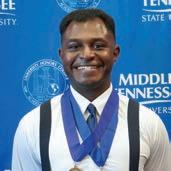
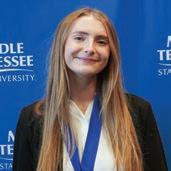
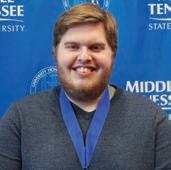
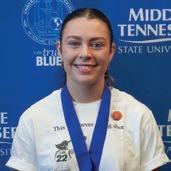
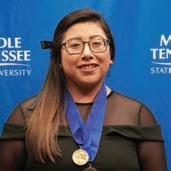
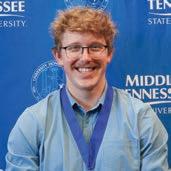

Rashieq Cockerham
Biology
“Characteristics of the Structure and Selected Biological Activities of Polysaccharides Isolated from Fedora 17 Hemp (Cannabis sativa)”
Paul Kline, thesis advisor
Elizabeth Counts
Nutrition and Food Science
“Examining Processed Foods in Food Banks and the Presence of Chronic Diseases in Food Bank Clientele”
Elizabeth Smith, thesis advisor
Andrew England
Biology (Microbiology)
“Assessment of Fetal Liver-Derived Alveolar-Like Macrophages (FLAMs) to Validate as a New Model for Studying C. neoformans Respiratory Infection”
David Nelson, thesis advisor
Alyssa Forbes
English/Applied Language – French
“The Current Failures of Title IX in Collegiate Athletics and the Modern, NIL Era Solutions”
Ron Kates, thesis advisor
Miriam Galindo
Economics
“Exploring the Connection Between Game-Based Learning, Social and Emotional Learning, and Critical Thinking through Tabletop
Role-Playing Games”
Eric Detweiler, thesis advisor
Gresham Groves
Psychology
“Applying a Multi-Dimensional Memory Model to Experience to Observe How Components of Experience Might Mediate the Relationship Between Personality and Christian Beliefs”
William Langston, thesis advisor
Hannah Harris
Chemistry, thesis advisor
“Bioluminescence of Firefly Luciferase in the Presence of Biologically Relevant Cations”
James Robertson, thesis advisor
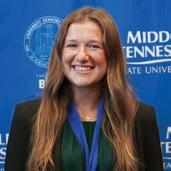
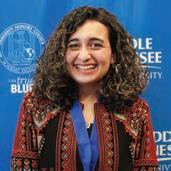
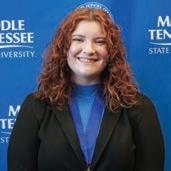

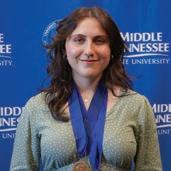
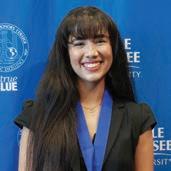
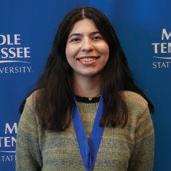
Hailey Harrison
Aerospace (Professional Pilot/ Flight Dispatch)
“Air Race Classic Ground
Crew Manual”
Peter Neff, thesis advisor
Rand Hasan
Biochemistry
“Synthesis and Evaluation of Polyaspartate Peptoid Polymers against Pseudomonas aeruginosa”
Kevin Bicker, thesis advisor
Elauna Hicks
Anthropology
“Assessment of MorphoPASSE
Software for Undergraduate Forensic Anthropology Education: Integrating Sex Estimation Technology into the Classroom”
Shannon Hodge, thesis advisor
Martha Huertas
Recording Industry (Commercial Songwriting)
“Nena: Creating Genre-Blending and Innovative Music”
Jamie Teachenor, thesis advisor
Hannah “Jo” Kadzban
Video and Film Production
“Identification with the Weapon: Sword Angel”
Leland Gregory, thesis advisor
Sevinch Kamaridinova
Biology
“Targeted RNA Interference Screen to Identify Novel Modifiers of Huntington’s Disease Impact on Adult Viability in Drosophila”
Kiel Ormerod, thesis advisor
Cedra Kamel
Biology
“Regulation of CITED1 Transcriptional Activity by Phosphorylation”
David Nelson, thesis advisor
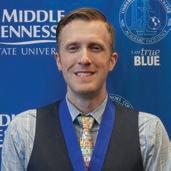
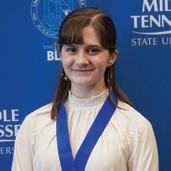





David Kiely
Biology
“Capitalizing on Curiosity: Putting Chemistry on Display”
Amy Phelps, thesis advisor
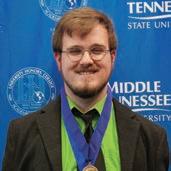
Lillian Laman
History
“Too Little, Too Late? Japanese Americans’ Views on Redress and Reparations”
Ashley Valanzola, thesis advisor
Josalyn Mandujano Cervantes
Information Systems
“The Start of a Small Business: Providing an In-Depth Look at the Start of a Small Business that Specializes in Handmade Goods”
Amelia Bozeman, thesis advisor
Tyler Martin
Marketing
“How Sustainable Branding of Grocery Foods Affects the Shopping Habits of Gen-Z Undergraduate Students”
Diane Edmondson, thesis advisor
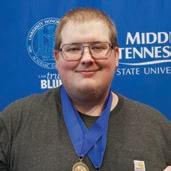

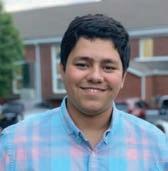
Caleb McCall
Audio Production
“Lo-Fi Recording: A Historical Exploration of the Sound and Genre”
Trevor de Clercq, thesis advisor

Gyllian Mullen
Music Business
“Road Warriors: DIY Artists and Touring as Independent Promotion”
Gloria Green, thesis advisor
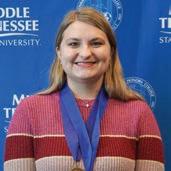
Caleb Peluso-Harper
Business Administration
“Reimagining the ‘Femme Fatale’ Trope Through a Cinematic Subtext: Fatale”
Claudia Barnett, thesis advisor
Jake Phipps
Video and Film Production
“Re-Repetitive: A Short Film Script Based on Retail Workers’ Mental Health Struggles in the Recovery Stages of COVID-19”
Leland Gregory, thesis advisor
Matthew Pierce
Religious Studies/Philosophy
“Faithful Films: An Exploration of Habitus and Implicit Functionality in Recent Evangelical Cinema”
Rebekka King, thesis advisor
Averill Reed
Nutrition and Food Science (Dietetics)
“Campus Cravings: Recipes for the Homesick Student”
Cindy Ayers, thesis advisor
Thomas Samir
Biochemistry
“Probing the Structural Requirements for the Binding of Aurones to ATP”
Scott Handy, thesis advisor
Ethan Schmidt
Journalism
“Independent Political Podcasts: The Band-Aid for the U.S. News
Media Industry’s Bullet Wound”
Christine Eschenfelder, thesis advisor
Laura Schroeder
Elementary Education
“The Positive Effects of Implementing a Variety of Teaching Approaches in the Classroom”
Katherine Mangione, thesis advisor

Meredith Taft
Audio Production
“A Guide to Rerecording One’s Music: A Taylor Swift Case Study”
Michael Hanson, thesis advisor
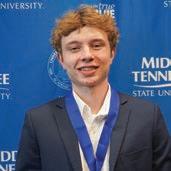

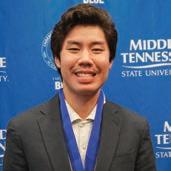



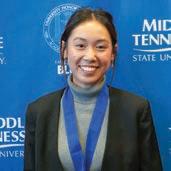
Ian Tatum
Computer Science
“Macro-Driven Virtualization of Rust Binaries”
Arpan Sainju, thesis advisor

Grey Warren History
“The Danger of Blindly Following Madison: The Impending Downfall of the Nation if It Continues to Turn a Blind Eye to Factions”
John R. Vile, thesis advisor
Bereket Tegistesillassie
Mechatronics Engineering
“The Capabilities of Various Search Algorithms and Design of a Micromouse Robot”
Vishwas Bedekar, thesis advisor
Kendall Thirakul
International Relations
Twitter (X) Under Elon Musk and Political Polarization Among University Students”
Robb McDaniel, thesis advisor
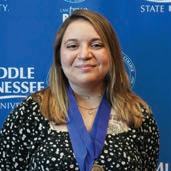

Zachary Thomas
Audio Production
“The Voice of the Heart: Expressing the Eight Core Emotions Through Song—A Creative Thesis”
Bess Rogers, thesis advisor
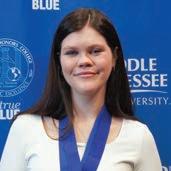
Benjamin Tscheschlok
Political Science/German
“Tech Bro Messiahs: How Tech
Billionaires Are Spearheading Late-Stage Reactionary Politics”
Robb McDaniel, thesis advisor
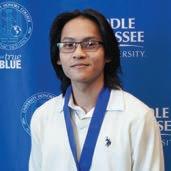
Samantha Viarengo
Sociology (Criminology)
“Intimate Partner Violence from the Viewpoint of the Abuser”
Meredith Dye, thesis advisor

Christina Vongsiharath
Music Industry
“Transmission of Traditional Lao Folk Music from Central Laos to the United States of America”
Mei Han, thesis advisor
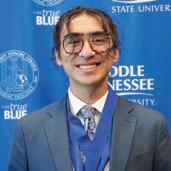
Arianna Alvarez Psychology
“The Lack of Diversity and Minority Voices in the Psychology Workforce: An Investigation of Barriers and Stigmas for Minority Groups Pursuing Careers in Psychology”
Judith Van Hein, thesis advisor
Ananya Arcot
Speech-Language Pathology and Audiology
“Visual Language Input Improving Vocabulary Learning in College Students: A Comparison of the Effects of Audiovisual, Visual, and Orthographic Input”
Meghan Wendelken, thesis advisor
Emily Caudill
Forensic Science
“Taphonomic Processes Etch Bones: An Experimental Look at Plant Root Etchings on Bovine Bones”
Shannon Hodge, thesis advisor
Muny Chet
Chemistry
“Determining Trophic Movement of Cyanotoxins in an Aquatic System”
Frank Bailey, thesis advisor
Colman Connolly
Audio Production/Data Science
“Michael Coleman and Irish Music’s Early Cultural and Sonic Fidelity: A Creative Remix”
Daniel Rowland, thesis advisor
Casey Epting
Biochemistry
“Characterizing the Healthcare Experiences of Karen Migrants to Middle Tennessee”
Laura Clark, thesis advisor
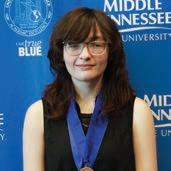



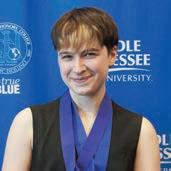
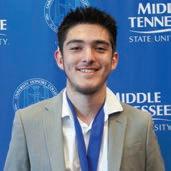
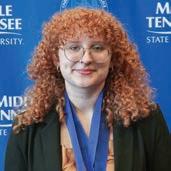
Jaymes Garcia
Recording Industry (Music Business)
“The Iliad: An Orchestration”
Eunbyol Ko, thesis advisor

Jenene Grover
Journalism
“The Impeachment Process: Partisanship, Polarization, Partisan Press, and the Integrity of the Presidency”
Michael Federici, thesis advisor
Jael Guest
French
“Representation of the American South and Its Dialect in Popular Media”
Mohammed Albakry, thesis advisor
Stephanie Hall
Media Studies
“If You Will: An Exploration of Gender Expression through Comedy in a Modern Retelling of Shakespeare’s Twelfth Night”
Claudia Barnett, thesis advisor
Madelyn Hansen
Theatre
“Disability Inclusion in Professional Theatre and the Ethics of Casting Disabled Roles”
Lauren Shouse, thesis advisor


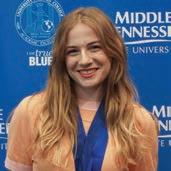

Nathaniel Harrison
Accounting
“A Comprehensive REALTOR ®
Business Plan: Blending Industry Insights and Academic Research”
Joshua Aaron, thesis advisor
Cadee Havard
Music Industry
“Throughline: Documenting the Third Space Created in Nashville’s Grassroots Music Scene through Oral History and Film Photography”
Michelle Conceison, thesis advisor
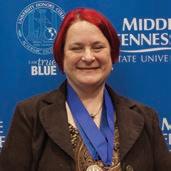
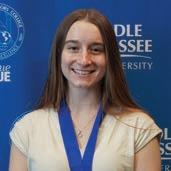
Delana Howard
Integrated Studies
“Female Rage on TikTok Builds Female Empowerment: The Evolution of Feminism in the Digital Age”
Amy Aldridge, thesis advisor
Aykut Iri
Finance
“Partnership 2020 and Foreign Direct Investment: The Growth of International Businesses in the Nashville Metropolitan Statistical Area”
Murat Arik, thesis advisor
Mera Ishak
Biochemistry
“Exploring How Undergraduate Science Majors Define a ‘Science Person’ and a ‘Scientist’ and How These Definitions Fit into Their Science Identities”
Katy Hosbein, thesis advisor
Isabel Jacober
Psychology
“Oxytocin’s Context-Dependent Effects on Maternal Motivation in Mice as Measured by the Ladder Task”
Tiffany Rogers, thesis advisor
Esmé Keszler
Animal Science/Science (General Science)
“Nutritional Value and Rumen Degradability of Sunn Hemp (Crotalaria juncea L.) in the Bovine”
Kevin Downs, thesis advisor
Deanna Lack
Religious Studies/Sociology
“Proclaiming Release: A Timeline of Religion and Abolition in Historical and Modern American Contexts”
Ashleigh McKinzie, thesis advisor
Ella Lancaster
Psychology/Public Writing and Rhetoric
“Father Figure Involvement on Identity Security in Young Adults” Megan Zeringue, thesis advisor

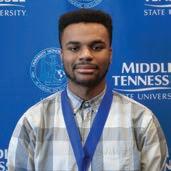

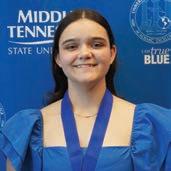
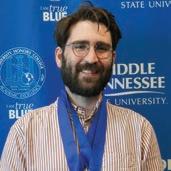
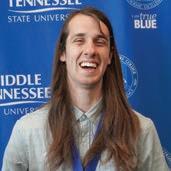

Jonathan Magdy
Biology
“Lead Optimization of MTL1-44 for Antibacterial Efficacy Against Staphylococcus aureus”
Kevin Bicker, thesis advisor
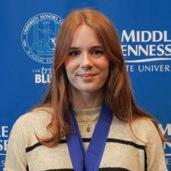
Jaelin McKethan
Computer Science
“What is My Purpose?: A Game Design Document for the Start of a Gaming Franchise”
Eric Detweiler, thesis advisor

Isaac Puckett
Biochemistry
“Comparison of Amino Acid-Catalyzed Reaction Options for the Knoevenagel Condensation”
Scott Handy, thesis advisor
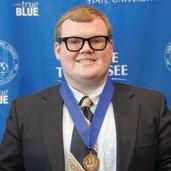
Rada Ryan
Visual Art
“Spirituality: A Forgotten Art”
Paige Medlock, thesis advisor
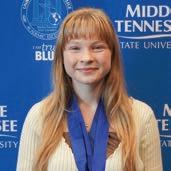
Jacob Salter
Computer Science
“Lowering the Energy Consumption of Pose Estimation: Multi-Device Dynamic Offloading of Voxel-Based 3D Human Pose Estimation”
Letian Zhang, thesis advisor

Wyeth Shawl
Communication
“The Owl House: Representation, Resonance, and Reciprocation”
Roberta Chevrette, thesis advisor

Joshua Sheets
Accounting
“Implementation of AI to Prevent and Detect Government Fraud”
Andrea Kelton, thesis advisor
Kyra Siciliano
Theatre
“A Director’s Process: Macbeth Noir”
Lauren Shouse, thesis advisor
Gita Swaminathan
Mechatronics Engineering
“An Inquiry into Memristors: Applications, Prospects for High-Volume Production & Market Forecast”
Antonio Saavedra, thesis advisor
John Tate
Video and Film Production
“From Japan to Tennessee: Producing a Japanese-Style Game Show in America”
Robert Gordon, thesis advisor
Allison Throm
Biology
“Interplay Between Pain, Age, and Cognition: Exploring Attentional and Neurophysiological Outcomes from Visual Search and RestingState Electroencephalography”
James Houston, thesis advisor
Joshua Wheaton
Computer Science
“Using AI to Identify Depression on Social Media”
Jaishree Ranganathan, thesis advisor
Olivia Wynne-Dossat
Marketing
“Introduction of Authors of Self-Published Books into Reading Development: An Additional and Beneficial Source of Children’s Enrichment”
Sherry Roberts, thesis advisor

By Nancy DeGennaro and Drew Ruble
If there’s one word that comes to mind when talking about MTSU alum and former top administrator Vincent Windrow, that word is “success.”
As an MTSU student, Windrow co-founded a campus chapter of the NAACP. He then helped lead the effort to remove a 600-pound medallion from Keathley University Center engraved with a likeness of Nathan Bedford Forrest, a Confederate general. He did so by meeting with then-MTSU President Sam Ingram and asking him to remove the plaque. If he didn’t, Windrow and others promised to lead a protest on MLK Day—and invite other NAACP chapters. The medallion was still there when campus emptied at Christmas break. But when January rolled around, it was gone.
As a young graduate, Windrow joined Zycron, then just a year-old workforce solutions company, as its vice president. For more than 12 years, he helped build the company from its humble beginnings as a $10,000 company into a business that reached more than $40 million in annual revenue; it was sold to a publicly traded company.
Windrow then returned to MTSU as director of the former Intercultural and Diversity Affairs office. He later became associate vice provost for student success, leading the newly launched Quest for Student Success. Spearheaded by MTSU President Sidney A. McPhee, the Quest radically rethought the University’s approach to student attrition. While MTSU has always targeted at-risk populations for support, the new Student Success initiative boosted every student’s chance to succeed.
To achieve it, Windrow and team overhauled student advising, developed fresh options for academic help, and redesigned courses that were traditional stumbling blocks to graduation. At the same time, it used predictive analytics—an approach more commonly associated with health care than higher education—to help identify students at statistical risk of attrition even if they don’t fit into traditionally “at-risk” populations. Armed with this knowledge, faculty and advisors could watch them to spot any problems early and get them back on track.


The results of the Quest have been dramatic. In 2017, MTSU was one of just 45 American universities invited to join Re-Imagining the First Year, an initiative sponsored by the American Association of State Colleges and Universities and funded by the Bill and Melinda Gates Foundation, to help other institutions improve their student success too.
Windrow retired from MTSU in May 2022. Today, he is an executive with Cornucopia Consulting Group, working with clients in the areas of higher education; K–12 education; diversity, equity and inclusion; mental health awareness; and leadership development.
But Windrow remains connected to his alma mater. He’s a member of the MTSU Honors College Board of Visitors. And he is also working closely with MTSU’s Center for Historic Preservation (CHP) to help preserve one of the state’s only remaining Black school buildings constructed during segregation.
Tucked behind a historic church on Old Nashville Highway near the Stones River National Battlefield and National Cemetery is an aging concrete block building that once served a bustling hub of activity. The Cemetery School has roots dating back to the late 1800s. The school served the Cemetery Community that grew out of the post-Civil War period. The community was founded by formerly enslaved families who worked burying Union soldiers at the neighboring graveyard that is now part of the U.S. National Park System.
Windrow and the Friends of Cemetery School are working to preserve it. They are doing so through a collaboration with MTSU’s famous Center for Historic Preservation.
“There so few surviving examples of segregated schools built in the rural South. At one time there were thousands of them. Rutherford County has one of the best-conditioned Black schools we have left. It’s remarkable,” said Carroll Van West, CHP director and the Tennessee state historian.
After integration happened in the 1960s, the Cemetery School was closed, and students were sent elsewhere. Queen Washington and her sister-in-law Bertha Washington, who lived by the school, purchased the property and began using the building as a gathering place for the Cemetery Community. Eventually, it became a storage facility for the family.
“If they hadn’t bought it, they would have torn it down and the story would have been lost. Now we get to tell the story,” said Windrow, his eyes brightening as he talked about the history of the school that his mother once attended. “And that’s powerful.”
Two-time MTSU alumna Leonora “Miss Boe” Washington, Windrow’s cousin who lived in one of the houses by the old school, wanted to restore the school she attended as a child. She sought help from West.
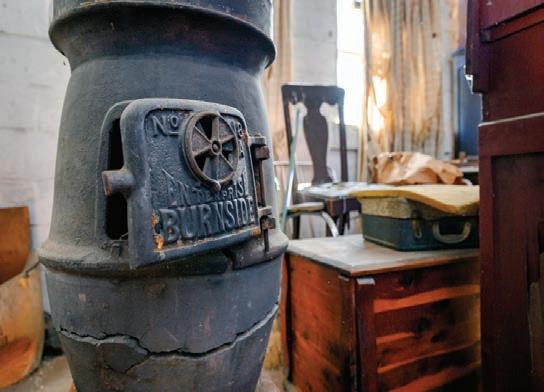
“Boe Washington made it her mission to save the school,” West said. “She first showed it to me 20 years ago, and she said, ‘You can help me preserve the school.’ ” West said several MTSU classes over 18 months “did a deep dive” on the school and community, which included doing interviews with former students and poring through documents. Since then, interpretive panels and an exhibit plan have been developed for the restoration project. Windrow, who also pastors Olive Branch Church in Murfreesboro and Nashville, said they discovered the Cemetery School building that stands today was constructed in 1941 by the National Youth
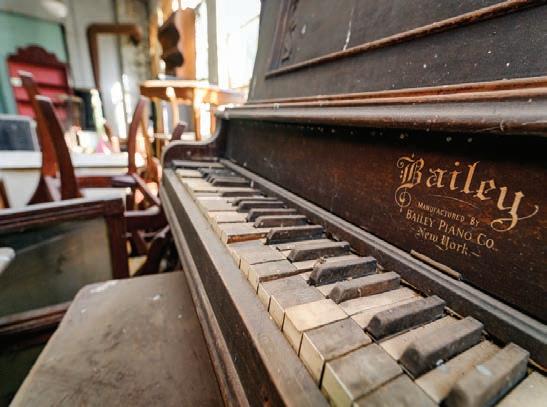


Administration, a New Deal program started by President Franklin D. Roosevelt to help unemployed young people find jobs and teach them skills during the Great Depression.
This is a story of resilience, a story of hope.
The Cemetery School construction was based on plans for a Rosenwald School—schools built in the early 1900s for Black children in underfunded areas of the South. The building program was developed through a partnership between Julius Rosenwald, part-owner and president of the iconic Sears & Roebuck Company, and legendary Black philanthropist and educator Booker T. Washington, founder of the Tuskegee Institute in Alabama.

“They were effective, efficient, and cheap to build,” West said. “A Rosenwald School had two rooms, a partition between them, and a stage at the end of a larger classroom.”
When “Miss Boe” died in 2019, Windrow took over caretaking duties. And that’s when the plans for restoration got closer to a reality. The next step was “cleaning house.”
“We probably cleared about 85% of it out. There was a pool table in there. Old tires in there, mattresses. There’s still a wood-burning stove in there,” Windrow said, looking around at the dust-covered collection of items that remained.
Inside the school, there’s a musty smell of history. Muted sunlight streaming through the tall windows illuminates the dust hanging in the air. Tiles are cracked and some parts missing. There’s no electricity or operational plumbing.
But years ago, Washington made sure the roof was repaired to keep out rain to protect the interior of the structure. All things considered, wear and tear from 80 years of history has not damaged the structural integrity.
Remnants of the old school remain: 1940s-era desks with initials carved into the wood, coal-burning stoves, dozens of ragged fabric-covered books with yellowed
pages, an art deco antique radio, and a well-worn piano. Outside there’s a dried-up water fountain connected to a well.
Those things will be incorporated into the restoration plans for a museum and community center.
“This side over here,” said Windrow, with his long arms pointing to the right, “will be the museum showcasing the history of Cemetery School and the Cemetery Community. I have all of Boe Washington’s report cards. We have the desks. We’ll have displays and signs telling the history and who taught here.”
Plans for restoration got closer to a reality.
The other side will be a gathering place and space for programming. Eventually they hope to have a park-like setting outside with pavilions.
The nonprofit Friends of Cemetery School group is working in concert with the battlefield, and there are grants available to help with paying for the restoration and maintenance.
The state of Tennessee already approved $250,000 of grants in the 2025–26 budget for the project.
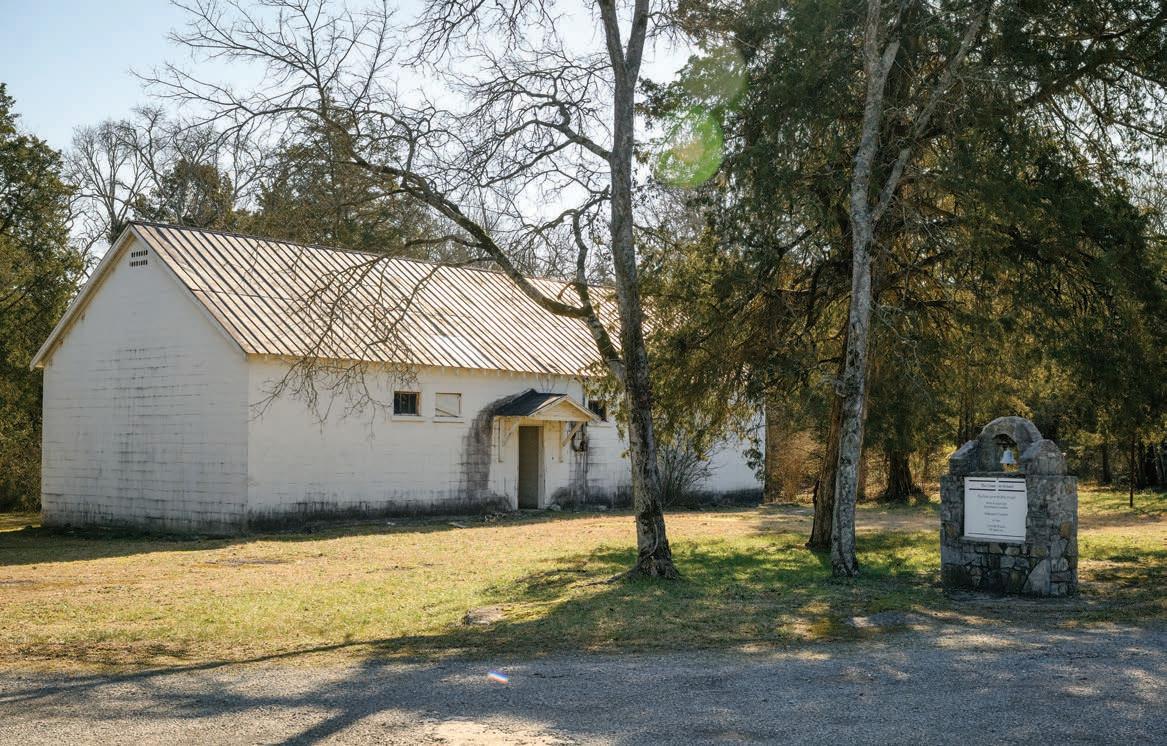
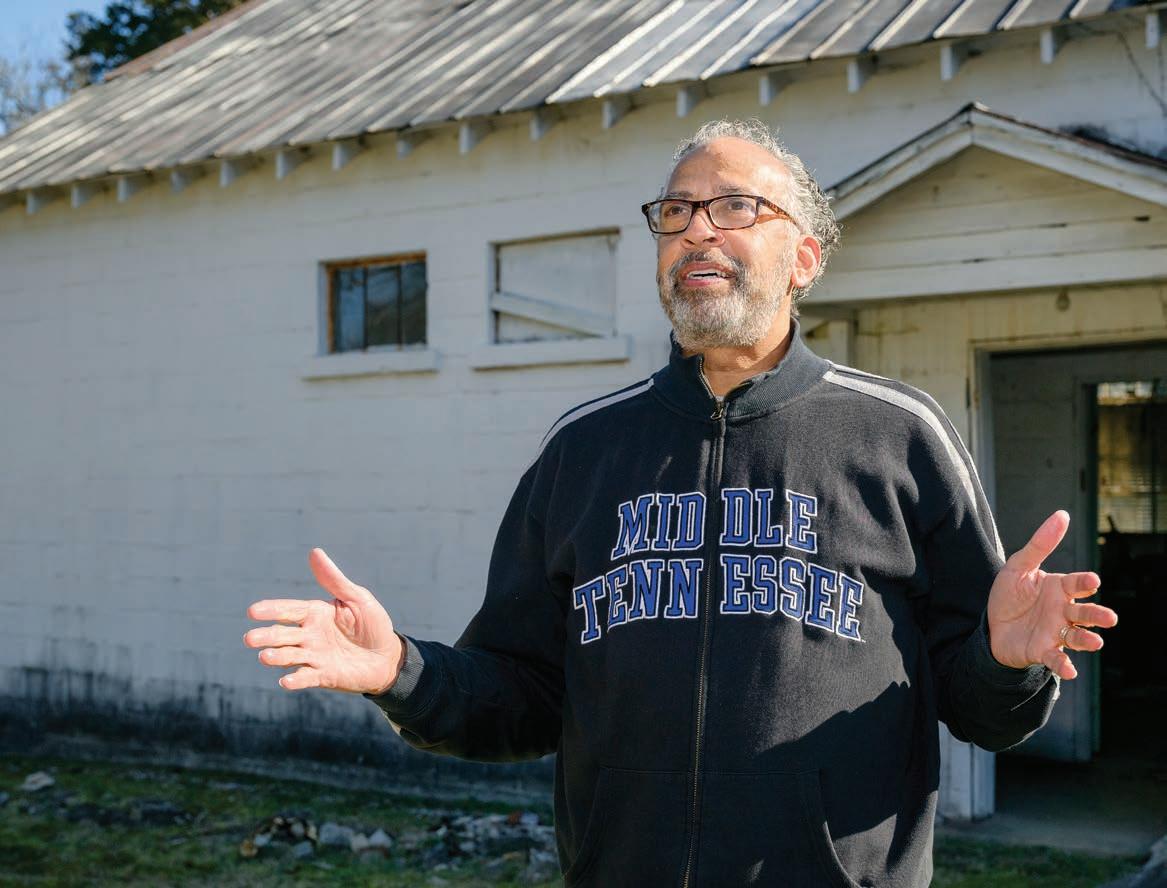
“We’ve submitted an application for a National Trust for Historic Preservation grant. We’ve received a grant from the Pi Gamma Gamma Foundation and donations from individuals,” Windrow said. “We are also looking to partner with construction firms who’d be willing to sponsor the electrical work, the roof repair, and the plumbing needs. . . . We’re trying to do a holistic rebirth and renovation.”
Plans are to open the museum in the summer of 2026.
“This is a story of resilience, a story of hope. This was their educational experience, and so they had to do what they had to do with what they had,” said Windrow, referencing the modest accommodations. “And so that’s using ingenuity. These teachers gave their lives to these students. So I am so excited about it.”
Windrow’s excitement and involvement seem likely to lead to a familiar outcome: resounding success.
Now we get to tell the story. And that's powerful. A
If you’re interested in helping with restoration efforts for the Cemetery School, email Windrow at vincent.windrow@mtsu.edu or call 615-981-0080.
You can also donate funds to the nonprofit Friends of Cemetery School on Cash App at $FOCSgive.
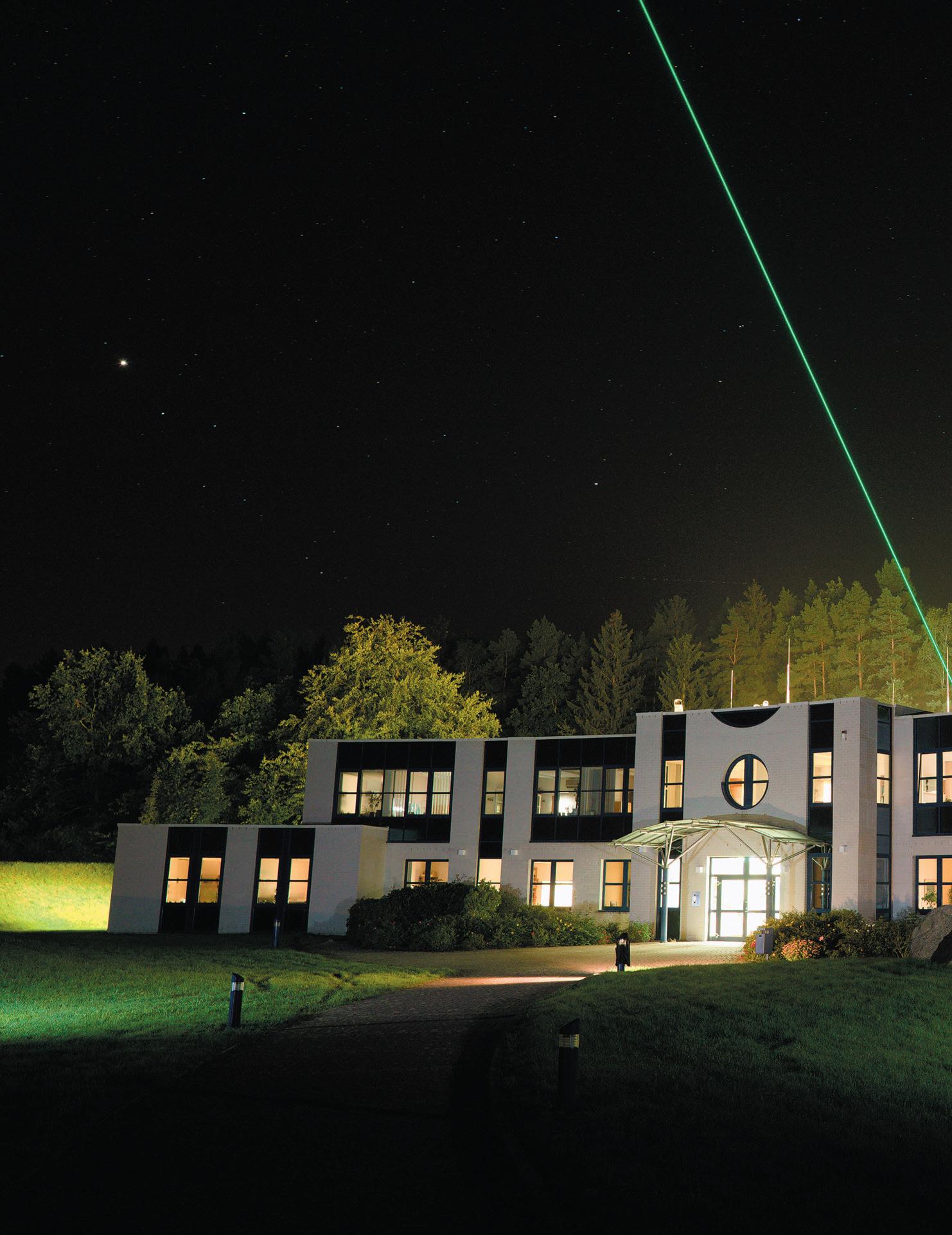
By Patsy Weiler
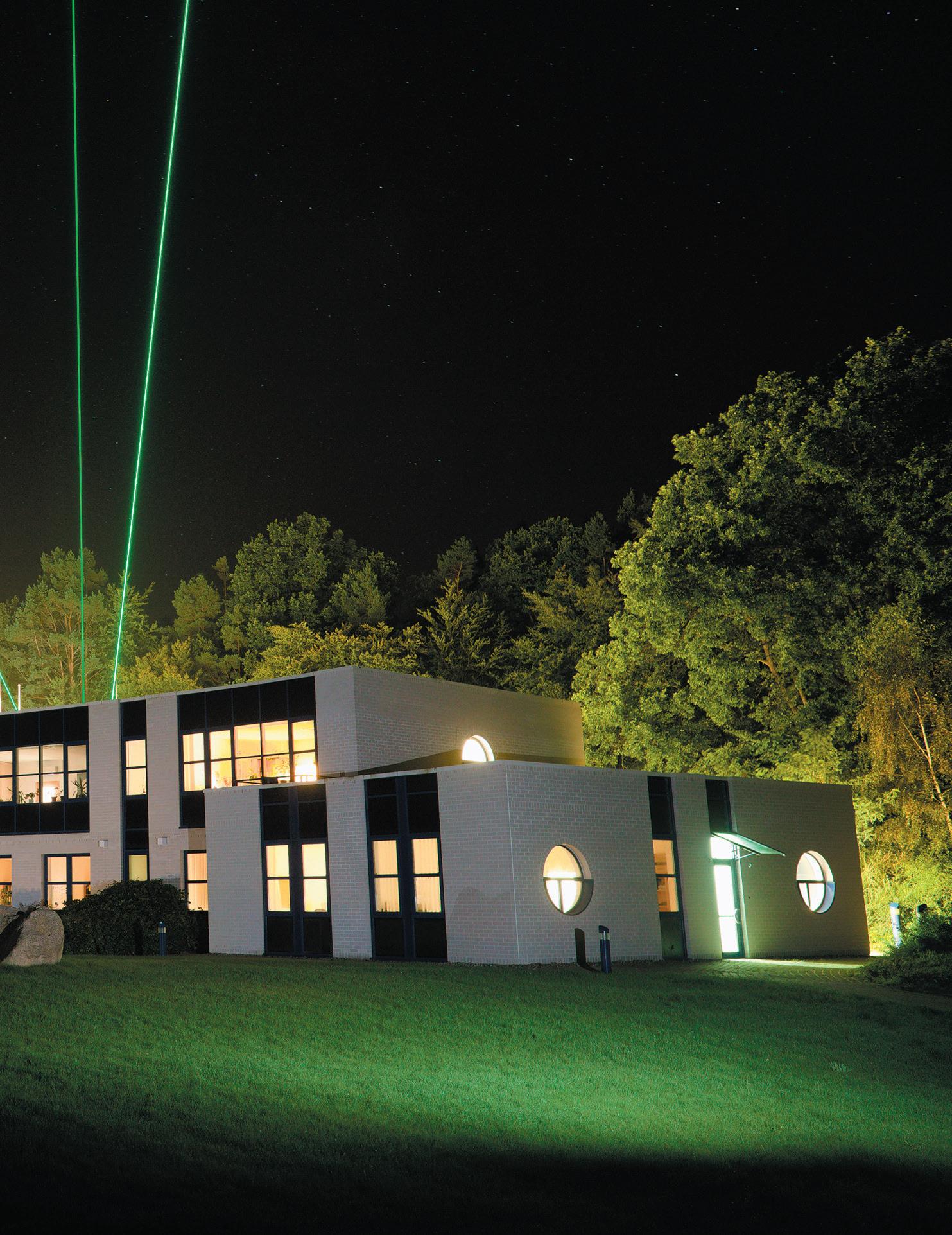
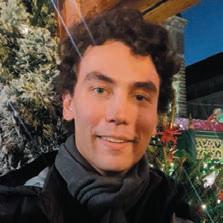
Jared Frazier’s new address in the small, seaside town of Kühlungsborn, Germany, is about 4,500 miles away from his roots in Spring Hill, Tennessee. It’s his latest stop on an exciting international journey of leading-edge weather and climate research and personal discovery.
The bright young man, a 2022 MTSU Honors College graduate, was hired in September 2024 as a computational scientist at the Leibniz Institute of Atmospheric Physics, which is connected with the teaching and research program of the University of Rostock. His employer is one of 96 independent institutes under the umbrella of the Leibniz Association.
As an MTSU undergraduate, Frazier, now 25, excelled in academics and research— while carrying a pocketful of wanderlust. He participated in the Honors in Italy summer program led by Honors College Associate Dean Philip E. Phillips. “This short time abroad really made me feel more confident about moving to a new country,” he said.
For Frazier, this experience was a springboard to the University of Amsterdam in the Netherlands during 2022–24, where he completed his master’s in Computational Science with a focus on high-performance numerical method. His area of expertise is in a rapidly evolving and rigorous interdisciplinary field of study, located at the crossroads of computer science and applied mathematics, used to solve complex science and engineering challenges.
Once he obtained his master’s, he applied for jobs in the U.S., but Frazier had a strong interest in gaining work experience abroad, a desire to be a software engineer/ programmer with scientific application and to be on the cutting edge of research that had a good impact on humanity. A mile-high order, for sure.
He found the perfect fit in neighboring Germany, about six hours away at the Leibniz Institute of Atmospheric Physics (IAP), where his co-workers hail from Cuba to Canada and the United States to Ukraine, “providing an international environment full of a really incredible mix of scientific and engineering experts,” he added.
At the institute, Frazier is enjoying a hands-on opportunity to interact with the ICON model—one of the world’s leading high-resolution computer modeling frameworks for weather, climate, and environmental prediction. It provides a nearly homogeneous coverage of the globe—for better, faster predictions of routine and severe weather events, particularly in Europe.
The IAP conducts research mainly on the middle atmosphere, particularly on the mesosphere and lower thermosphere (approximate altitude of 50 to 200 kilometers, or 31 to 124 miles), as well as on the dynamic coupling between atmospheric layers at different altitudes from the troposphere—which starts at the Earth’s surface and extends 5 to 9 miles—to the thermosphere. Between these two locations are the stratosphere, or the ozone layer, and on top of it the mesosphere, where meteors burn up.
Claudia Stephan, head of the IAP’s Modeling of Atmospheric Processes Department and Frazier’s supervisor, explains the focus of this area is to research the dramatic changes the terrestrial atmosphere is experiencing.
“The lower atmosphere is warming, while the middle and upper atmosphere is cooling,” she said. “As a result, the upper atmosphere is contracting, which has direct and substantial effects on the lifetime and trajectories of satellites and space debris. There are growing needs for operational weather forecasts of the atmosphere that extend beyond heights of 100 kilometers, or about 62 miles.”

“The rapid development of the civil, commercial, and military use of space requires an increasingly precise determination of trajectories for rockets, satellites, space debris, and controlled reentry scenarios,” Stephan said. “Atmospheric layers at altitudes between 50 and 200 kilometers (31 to 124 miles) play a crucial role, but accurately modeling these altitudes is a big challenge. Our department develops a numerical model that can provide relevant products from weather to climate timescales to address these emerging societal needs.”
Frazier is part of the equation.
“Jared plays a key role in making our code sustainable, well-documented, and in optimizing the workflow from simulations to analysis and visualization. His efforts improve the quality of our work and the speed at which we can publish new findings,” Stephan said.
“The code is long and complex, and the amounts of data we produce are enormous. Jared helps managing the code development, finding the optimum settings to minimize computer resources, and designing software for analyzing the data as quickly and as efficiently as possible. With his creative solutions, he supports the entire team of model developers and researchers.”
Frazier said his daily life “consists primarily of talking with scientists at the institute about what their workflows look like regarding downloading, preprocessing, running computer simulations, and
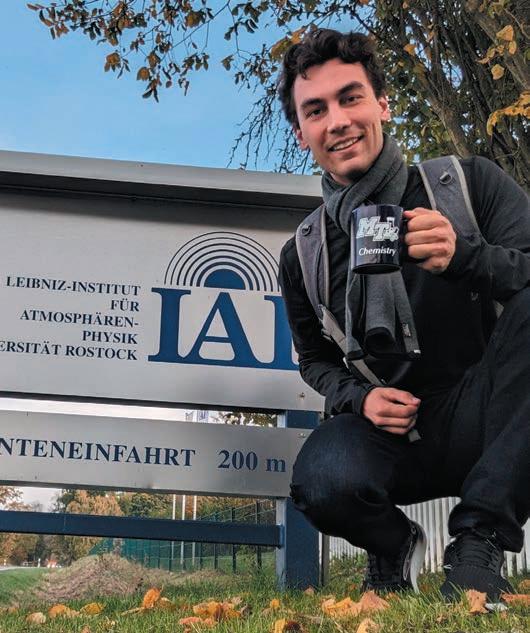
postprocessing. Then, I code up software solutions, including usage documentation, that can be used by our institute’s scientists.”
He was always a proactive and a motivated student with a keen interest in international research, even as an undergraduate.
Because of Frazier’s software engineering background and high-performance computing training, his work translates into a greatly improved scenario. While previously a scientist might have had to wait four or more hours to process data and then visualize it using their scripts, now they only have to wait about 30 minutes, and there are significant energy savings involved.
After graduating from MTSU, where his undergraduate research included studying weather patterns on the red planet as part of the Blue Mars project, Frazier decided to earn his master’s abroad for “essentially two reasons.”
“First, to work in an international environment to broaden my understanding of the scientific community and learn to adapt to unique cultures of different countries. Secondly, I wanted to deepen my software development skills, but with a particular focus on scientific problems,” he said. “My time at the university was good preparation for my work now at IAP. I really ‘discovered’ high-performance computing for myself and became fascinated with the details of how to develop efficient, scientific software.”
Although he didn’t know anyone in Europe, Frazier is flourishing. He became proficient in Dutch and is working on his German language skills.
“Just showing genuine interest in where people are from, picking up phrases or practicing whole languages really made me bond with people I never could have before,” said Frazier, who traveled to Paris for Christmas 2024.
Laura Clippard, MTSU’s undergraduate fellowships and Honors College coordinator, wasn’t surprised about Frazier’s latest venture. She mentored Frazier, who was an MTSU Buchanan Fellow—the University’s most prestigious scholarship for freshmen—when he successfully sought the esteemed Barry M. Goldwater Scholarship for undergraduate scientific study.

“He was always a proactive and a motivated student with a keen interest in international research, even as an undergraduate,” she said.
“I am thrilled to see a former MTSU Honors student thriving in such a distinguished scientific organization.”
Outside Frazier’s work window, he can view the Baltic Sea. “Across from us is Denmark. Life is quiet here,” he said. “I live in a large province called MecklenburgVorpommern, formerly in East Germany. Kühlungsborn has a beautiful view of the sea, a quaint boardwalk, and pier, as well as a smattering of bakeries and shops along the coast and in the town center.”
Away from his office, you’ll likely find Frazier “biking along the coast or just to nearby towns to see what there is to see,” he said. “When I stay in Kühlungsborn, I usually am reading books or listening to German podcasts, with the strong winds and hypnotic crashing of the waves in the background while walking along the coast.”
Some weekends, he visits the University of Rostock library, where the avid reader can obtain copies of free German student magazines to help with learning the language and keeping up with area events. He has also enjoyed the local German Christmas markets.
Reflecting on his time at MTSU, Frazier said, “It prepared me well for the future, to work and learn from international colleagues, since I spent a significant amount of time with Mengliang Zhang,” a former MTSU Chemistry assistant professor.
“Through coursework ranging from artificial intelligence to physical chemistry, I learned how to approach a wide range of scientific problems as well as disseminate one’s findings in a professional manner and was fortunate to co-author several papers. I cannot emphasize enough the excellent quality of the staff and professors in the Honors College. They helped me apply for and win national and international fellowships and properly introduced me to the process of grant writing and application writing at a very competitive level.”
This short time abroad really made me feel more confident about moving to a new country.
What’s on the horizon for Frazier?
“It’s hard to say where I see myself. I think I will very likely stay in the domain of climatology/numerical weather prediction,” he said. “Maybe I end up at a U.S. government lab, somewhere in industry, or maybe I stay in Germany for several more years. Time will tell. I’m open to anything.”
One certainty: The sky’s no limit for Frazier’s future trajectory. A
By Bree Cornell

Honors alumna, current master’s student, and MTSU employee Johari Hamilton is a career writer with a fascinating story.
“I joke that I’m not a nontraditional student; I am a very nontraditional student. I returned to college at 46,” she said.
Hamilton worked for 20 years in health care, which allowed her to listen to a range of patients’ stories, from sorrowful to joyful. She transitioned from this into public relations, a seemingly much different career—but fostering connection is the core of both.
Hamilton connects with students, alumni, faculty, staff, and donors. The donors are a varied group with their own motivations for giving to the University, and she can relay to them how their funds make a positive impact.
“Their support provides private financial assistance for scholarships, research, studying abroad, new equipment, and emergencies,” she said. Overall, she emphasized that stewardship is not only about generosity and gratitude but about demonstrating the impact as well.
Now a coordinator for giving and donor relations in MTSU’s Development Office, Hamilton is pursuing her master’s in Media and Communication, so her involvement with the school is a major part of her life. As an undergrad, she worked as a PR intern for a media company through the Tennessee Small Business Development Center in Memphis, which solidified her desire to pursue public relations.
“PR is about people!” she said. “It’s about building relationships and sharing the value of those relationships with others.”
Hamilton shared her many roles in her life: health care professional, wife, mother, and grandmother. Challenged to start over as a career writer and student, she has gained the wisdom that experience—while inherently valuable—does not define you.
Rather than staying in the same roles, Hamilton embraced her ability to change and explore new academic and career pathways. She gained additional communication skills and an even deeper sense of empathy.
Many opportunities she had would not have been possible without financial aid, so it is rewarding for her to make a difference for students in need of it.
“I am using my public relations and strategic media skills to assist with developing and implementing annual giving campaigns like True Blue Give, a three-day campaign that raises funds for scholarships and occurs in February,” Hamilton said. “This year, thanks to all our wonderful supporters, we surpassed our goal and set a new record by raising over $1 million.”
This program and others, such as the Senior Gift tradition that encourages new graduates to give, help the school—and students—flourish.
I am a very nontraditional student. A
Alongside her writing and organizing at MTSU, Hamilton is studious and dedicated to her academic research. She says that her appreciation for academic research began with the Honors College, where she improved her critical thinking and research skills. And with high standards for professionalism, leadership, and service, the example set by the Honors College reinforces her work as a community advocate.
She found more fulfillment in working as a graduate assistant for MTSU’s News and Media Relations, an environment of storytellers and skilled communicators. One particular story she wrote during her time there stood out to her: an article about the Come to Voice summer camp, hosted by the Scott Borchetta College of Media and Entertainment, teaching young students about digital media literacy.
The 2024 article covered the students’ interaction with the Bragg Building’s XR Studio, Walker Library’s Makerspace, and the WTVF-TV NewsChannel 5 studios in Nashville.
“The story tops the list of all the stories I wrote because it continues to be written,” she said. “Those middle and high school students left our campus inspired to attend college. Some will be the first generation.”
Hamilton resonates with empowering experiences she can write about, and they fill her with a humanitarian purpose. Her writing about the media literacy program enabled it to have more support and outreach, and as she personally asks herself beforehand, “How will writing for the company or organization serve the greater good?”
As a student, Hamilton is hard at work on her master’s thesis proposal defense.
“Focus on what interests you,” she shared when asked about advice on writing. “Whether it’s a thesis, dissertation, news article, or any other writing format, choose something you will enjoy researching, reading, observing, learning, and writing about. When considering a career that involves writing, like journalism or public relations, think about your interests, frustrations, and where you want to make a difference.”
By Robin E. Lee
For many musicians, a place in a hall of fame represents the pinnacle of their career—a validation of years of hard work, talent, and dedication.
For singer-songwriter and MTSU adjunct professor Jamie Teachenor, his induction into the Missouri Music Hall of Fame is not only a professional milestone but also a deeply personal honor—one rooted in family, heritage, and an unwavering passion for music.
In addition to his extensive career in the music industry, Teachenor shares his expertise with Recording Industry and Honors students at MTSU, offering them real-world insights into the evolving landscape of music production and business. His role at the University allows him to mentor aspiring professionals and contribute to developing the next generation of industry leaders.
“Jamie is an extraordinary teacher and songwriter. I am still in awe that he wrote the anthem for the U.S. Space Force, which will be celebrated long after we are gone,” said Beverly Keel, dean of MTSU’s Scott Borchetta College of Media and Entertainment. “His passion for music, education, and our students is inspiring, and his enthusiasm and optimism are contagious. Our students are fortunate to be able to learn from such a talented music leader.”
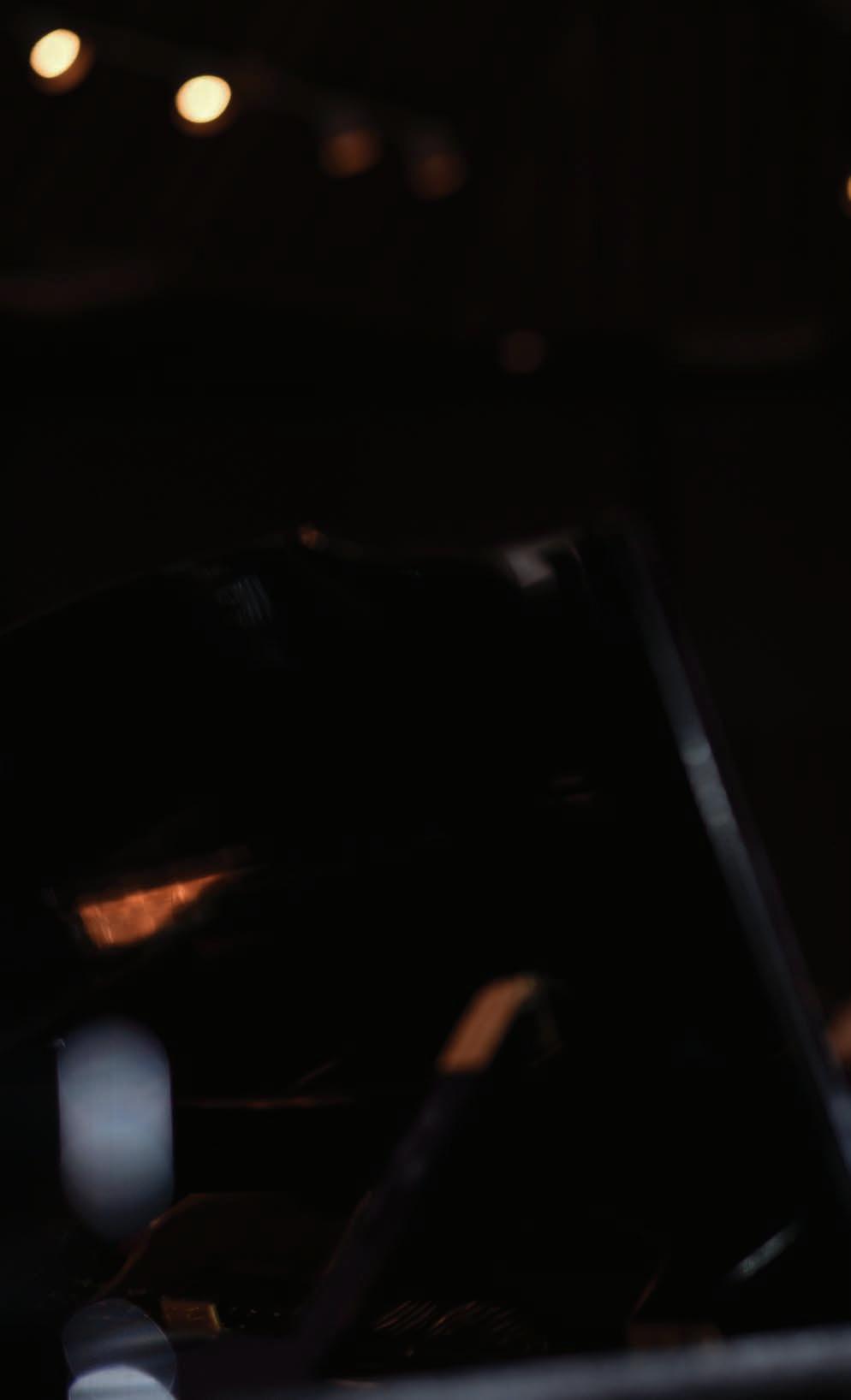
From his birth in the tiny unincorporated town of Fagus, Missouri, Teachenor’s life was steeped in music. His childhood was filled with melodies, from the echoes of his grandmother’s piano—an instrument she acquired by trading her father’s fiddle—to the impromptu jam sessions that would last into the early morning hours with family and friends.
His father, Jim, a Rockabilly Hall of Fame inductee, was not only his greatest influence but also his biggest fan. It was Jim who inspired Jamie’s first song, “You Can Fall in Love with Me,” penned about his high school sweetheart and now wife, Jen.
Growing up in the southeastern corner of Missouri, just inside the upper Mississippi Delta, Teachenor was heavily influenced by the Memphis and Nashville sounds of country, rockabilly, gospel, blues, R&B, soul, and bluegrass. His great-grandfather, Charlie Hammon, was a champion fiddler who performed barn dances across the South and Midwest in the 1920s with Teachenor’s grandmother, Bertie, accompanying him on a pump organ. His father, Jim, toured with his rockabilly band, The Panthers, in the 1950s and ’60s.
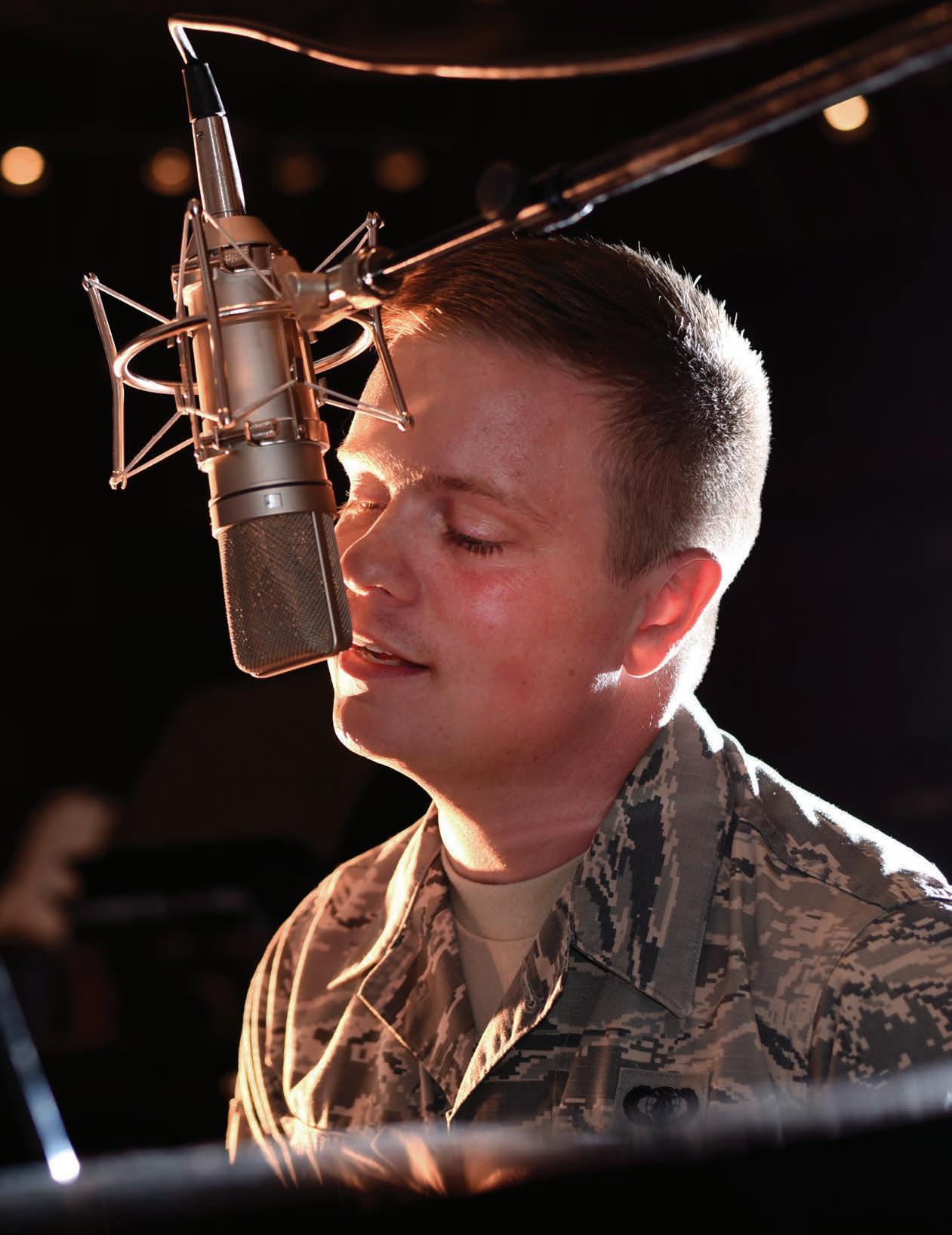

From an early age, Teachenor performed in a variety of venues—churches, bars, rodeos, fairs, even high school study halls—wherever there was a piano and an audience. His Saturday nights as a teenager were often spent in his truck, parked on a field road, listening to the Grand Ole Opry and dreaming of one day moving to Music City.
“Missouri made me who I am. And to be honored in the place where my journey began—well, that means everything,” he said of his Hall of Fame honor.
Teachenor’s musical journey took him to Nashville, where he had the opportunity to collaborate with country music icons like Luke Bryan, Blake Shelton, and Trisha Yearwood.
His time with Bryan started at Murrah Music, where they bonded over bass fishing and their shared love for country tunes. He recalls a humorous moment with Shelton: “Blake sat on an amplifier right in front of my vocal mic in the studio and pretended to conduct— with a beer in his hand.”
One of his proudest moments was when Yearwood recorded his song “Met Him in a Motel Room” for her album Prizefighter: Hit After Hit. She invited him and his wife to a private album release party.
“How Do You Get That Lonely,” recorded by Blaine Larsen, is one of Teachenor’s most well-known works.
an airman first class. Touring across the country, he performed for troops and civilians alike, bringing music to the military community.
Teachenor’s service in the Air Force led him to an even greater honor: composing the official anthem for the U.S. Space Force.
He returned to the Grand Ole Opry—not as a Nashville songwriter, but as an Air Force musician in his service uniform.

The song, which became his first hit single, was inspired by the tragic loss of a high school student who took his own life. Teachenor and co-writer Rory Feek crafted the song in just over an hour, capturing the heartbreaking reality of loneliness and despair.
“That song opened a lot of doors for me,” Teachenor reflects. “But more importantly, it resonated deeply with people. Fans would come up to us and share how the song had saved their life. Those stories stay with me.”
In 2015, Teachenor took an unexpected detour in his career, enlisting in the U.S. Air Force at the age of 35. He became a member of the Air Force Academy Band’s country ensemble, Wild Blue Country, as
“For the first time, the music wasn’t about me. It was about the people we were playing for,” he says.
Teachenor’s service in the Air Force led him to an even greater honor: composing the official anthem for the U.S. Space Force, “Semper Supra.” Inspired by the guardians in the new branch, he spent months researching space history and working to craft a song that would honor the newest branch of the military. His anthem was officially adopted and performed at the Pentagon in 2022.
“When I wrote ‘Semper Supra,’ my greatest hope was that people wouldn’t think of me when they heard it, but instead, they would think of the amazing men and women who serve in the Space Force,” Teachenor said.
From his roots in Fagus, Missouri, to his induction into the Missouri Music Hall of Fame, Teachenor’s career is a testament to passion, perseverance, and purpose. His story is one of unwavering dedication to his craft, his country, and the power of music to inspire, heal, and connect.
With his doctorate from Liberty University, he is now proudly a member of the Honors faculty, teaching songwriting and music business at MTSU.
“I hope to impact everyone I meet in a positive way, and I hope I give more than I take. As an educator, I am less important than the ones looking to me for education.” A
By Robin E. Lee
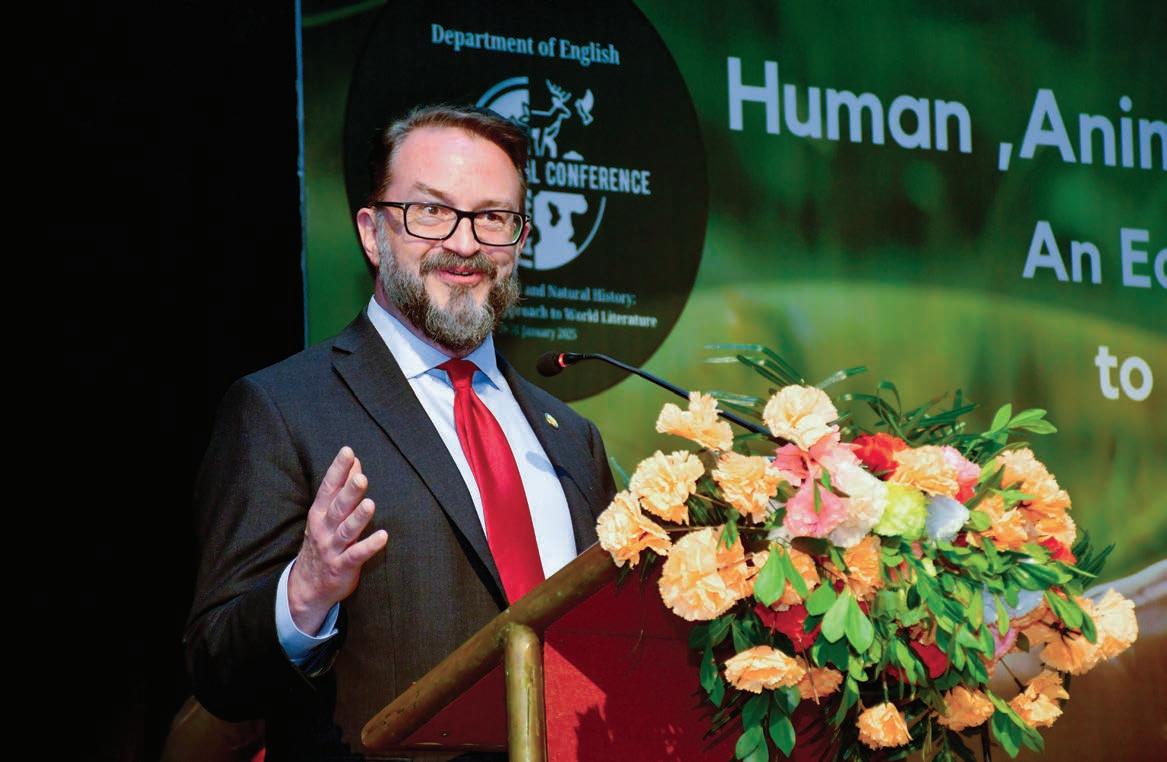
Honors Associate Dean Philip E. Phillips’ research on the literary representation of animals in American literature inspired an international conference in India where he served as keynote speaker this year.
Khagendra Sethi, head of the English Department at Ravenshaw University, had engaged in “a stimulating discussion” with Phillips more than a decade ago at a conference in Italy. Following Phillips’ work since then, Sethi invited Phillips to the International Conference on Human, Animal, and Natural History: Ecocritical Approaches to World Literature, which was held at the university in Cuttack, Odisha, India.
The conference theme was even developed from Phillips’ scholarly work, reflecting the global significance of ecocriticism. The three-day event brought together scholars and students from around the world to explore the intersection of literature and environmental concerns.
“Over the years, I followed his work closely, particularly his evolving research on ecopoetics and the literary portrayal of non-human life,” Sethi said. “When we began planning our international conference, I reached out to him to reconnect and learn more about his current research. Our conversation reaffirmed my belief that his scholarship—especially his work on Edgar Allan Poe and Robert Frost—offered a fresh and compelling
perspective on the intersection of literature, ecology, and animal studies.”
Aryaprava Nayak, an assistant professor of English at Ravenshaw University, said Phillips’ research on poets like Poe and Frost, “who engage with animals in rich and nuanced ways, made him an ideal choice.”
“His scholarly approach provides invaluable insights into the complex relationships between humans, animals, and the natural world, making him a perfect fit for sparking meaningful conversations at the intersection of literature and animal studies,” Nayak said.
Ecocriticism plays a central role in the literary studies curriculum at Ravenshaw, where the department integrates ecocritical approaches to works by authors such as William Wordsworth, Walt Whitman, Toni Morrison, and Frost, as well as contemporary writers like Arundhati Roy and Amitav Ghosh, Nayak said.
At MTSU, Phillips has led two Honors Lecture Series on environmental and ecological themes: “The Environment” in fall 2011 and “Climate Change” in spring 2020.
“Our MTSU students share this global concern for the natural world and our fellow creatures,” he said.
“And our faculty across the disciplines, from Biology and Geosciences to English and Agribusiness, are engaged
in research initiatives and community partnerships to address pressing environmental challenges.”
In his keynote address, “Ecopoetics and the Representation of Animals in Robert Frost,” Phillips examined the famed American poet’s complex portrayal of the natural world. While Frost is not typically classified as an “ecopoet,” Phillips argued, his poetry—steeped in rural New England landscapes and rich with animal imagery—foreshadowed many of the themes that define modern ecocritical studies.
“Frost calls our attention to, but refuses to resolve, either the complexities of human and non-human animal behavior or the larger questions implied in his nature poetry,” Phillips noted in his speech. “His birds, horses, chickens, frogs, insects, and all the rest, with their deliberate ambiguity, invite us to regard them—and the non-human animals in our own lives—with greater attention, sympathy, and perhaps even solidarity.”
Throughout the conference, participants delved into major themes such as the representation of animals in literature, the impact of human activity on the environment, and the interconnection between human, animal, and environmental histories.
“These discussions are deeply relevant to environmental issues in India, where biodiversity loss, human-wildlife conflict, deforestation, and industrialization pose significant challenges,” Nayak said.
As the field evolves, Nayak sees ecocriticism expanding into new interdisciplinary territories. “We anticipate growth in areas like climate change literature, ecofeminism, animal studies, and Indigenous environmental narratives,” she said.
The conference drew over 500 English majors. According to Phillips, discussions extended beyond theoretical analysis to urgent real-world concerns and the artist’s role in addressing them.
“It became clear to me that in India, people are taking environmental issues and threats to nature very seriously,” he said. “Over and over, attendees spoke about the problems associated with overpopulation, industrialization, and pollution. The rivers and the air quality gave evidence of the severity of the environmental challenges facing India and the world.”
Hosting an international scholar from MTSU was a meaningful opportunity for Ravenshaw.
“It facilitated a rich academic exchange between our university and a respected institution known for its contributions to ecopoetics and literary studies,” Nayak said. “This exchange benefits both institutions.”
Phillips’ participation at the conference advanced his research and helped elevate MTSU’s international academic reputation. His recent publications in this area include chapters in Animals in the American Classics: How Natural History Inspired Great Fiction (2022) and Animals in Classic American Poetry: How Natural History Inspired Great Verse (2025). Phillips, recent recipient of MTSU’s Career Achievement Award, also will edit a collection of selected essays generated from the conference.
His experience underscores the value of global academic exchanges, which MTSU actively supports for faculty and students.
These discussions are deeply relevant to environmental issues in India.
“Such intercultural opportunities are so important for educators and especially for our students, for whom such experiences open up new ways of seeing the world and occasions for collaborative problem-solving,” Phillips said.


legacy of civic leadership as ADP passes the baton
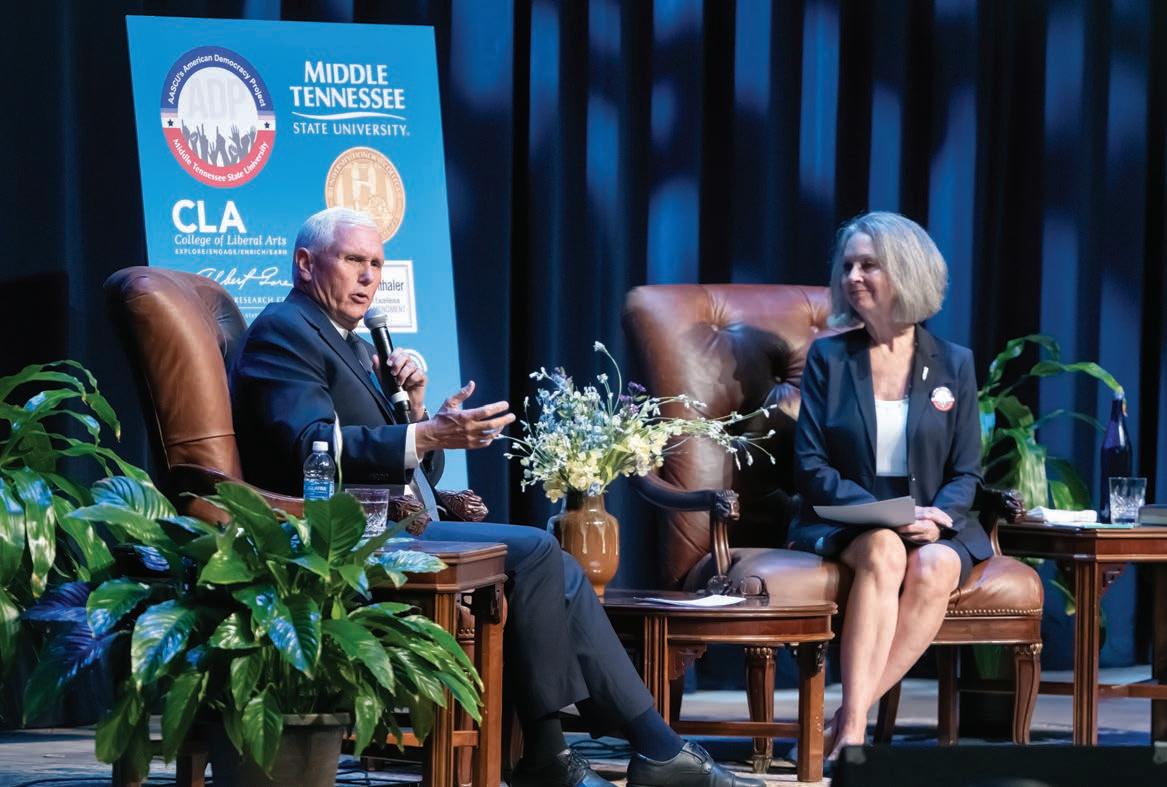
By Nancy Prescott
In the early 2000s, as public discourse in America grew more divided and questions about civic literacy mounted, a quiet movement took root in higher education—a movement that would soon find a powerful advocate at MTSU.
It was 2004 when then-Provost Kaylene Gebert and fellow historian Jim Williams, head of the campus American Democracy Project (ADP) and incoming director of MTSU’s Albert Gore Research Center, extended an invitation to Mary A. Evins. They asked her to attend a national ADP conference in Baltimore, a gathering of educators committed to reenergizing democratic engagement through public education.
The American Democracy Project, launched just a year earlier by the American Association of State Colleges and Universities (AASCU), was designed to unite institutions in a common goal: preparing students to be informed, active participants in the nation’s participatory democracy. MTSU had joined the movement early. Current MTSU Provost Mark Byrnes served as the founding campus director of ADP, and Williams was the second. Under their leadership—and with Gebert’s vision from the Provost’s Office—MTSU was laying a solid foundation for the work ahead.
That conference in Baltimore would change everything for Evins. What she witnessed there—a passionate network of educators seeking to instill civic agency in young people—resonated deeply. She joined the effort soon after. By 2008, she became MTSU’s third ADP director, and the University’s role in civic engagement would never be the same.
“I was swept away by that conference,” Evins said. “It was filled with passionate faculty focusing on teaching for meaning. It provided a framework and structure for what I knew in my core to be true, that civic learning is potent best practice in higher education.”
Evins is a rising tide that lifts all boats. A trained historian and servant-leader, she has spent the last two decades sweeping students up in her current— not to redirect them, but to empower them to chart their courses.
She sees untapped potential in her students. And under her guidance, they have gone on to win prestigious fellowships, pursue graduate studies across the globe, and serve in government, in courtrooms, as CEOs, and in countless museums, research labs,
national parks, classrooms, and archives. They come from all walks of life, yet, under her leadership, they learned to build community, to question systems thoughtfully, and to act deliberately for the common good.
From organizing peaceful First Amendment demonstrations to petitioning local, state, and national leaders, her students practiced democracy—not as a distant concept, but as a lived responsibility. Many presented original civic engagement research at national conferences hosted by the National Association of Student Personnel Administrators and AASCU, launching them into educational and career opportunities that were once beyond reach.
Her most enduring work lies in her unwavering commitment to voter engagement. Evins embraced the “ask every student” philosophy with unmatched zeal. It wasn’t unusual to find her sitting in the Quad with a student, phone in hand, calling election commissions nationwide to answer questions about registration, absentee ballots, or polling locations. No student graduated from her classroom without a renewed sense of civic duty—and a concrete plan to vote.
As she often said, “Voting is our nonnegotiable duty as American citizens.” Evins, the daughter of a former congressman from Tennessee, believes deeply in the power of early participation: “The sooner a human being engages in the physical act of voting, the sooner they become a participating citizen for a lifetime,” she said.
The University’s role in civic engagement would never be the same.
Due to her efforts, MTSU earned repeated national honors from the ALL IN Campus Democracy Challenge, including “Highly Established” status and being the top public university in Tennessee for student voter registration three years in a row.
“It’s absolutely imperative that civic learning not be just episodic or saved for celebratory occasions, but that it be embedded in everything we do on a regular basis,” she said. “We want to help our students to be able to vote while they are under our care. . . .
“The practice of voting secures students’ commitment to active citizenship and voter participation for the rest of their lives. Eighteen-year-old Americans must be supported when they first engage as voters, not be confused, undervalued, and deterred.”
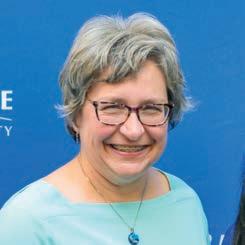
From its origins under Gebert and founding directors Byrnes and Williams, to the transformative leadership of Evins, and now into the capable hands of Amy Sayward, pictured left, the ADP at MTSU stands as a living testament to the power of education in sustaining democracy.
Taking the reins as MTSU’s fourth ADP director, Sayward is a professor of History and a campus leader with deep experience in both scholarship and service. Her background in U.S. and international history and her collaborative approach to leadership position her well to carry forward the ADP’s mission in a time of national change.
Sayward is also no stranger to civic learning. She has worked across departments and committees to promote inclusive education and community engagement. Under her direction, the ADP is expected to continue its expansion, bridging academic inquiry and real-world action, while equipping students with the tools to participate meaningfully in the democratic process.
“It is not a cliché. Students are the leaders of their generations,” said Sayward, who has often given extra credit for students who are or who become registered voters. “They will make a difference whether through their actions or their indifference.”
Thanks to her ADP predecessor, Sayward has a strong infrastructure to build upon. Evins, who retired in summer 2025, has not only served her classrooms— she has modeled what it means to be a citizen. She has shaped not just programs, but people. Her legacy is woven into the fabric of MTSU and the many communities now led by those who learned from her.
As the American Democracy Project turns the page to its next chapter, it is buoyed by her example—and forever grateful for the rising tide she became.
The American Democracy Project will continue serving as a campus civic cornerstone, hosting Constitution Day celebrations, expanding studentled voter engagement efforts, and encouraging open dialogue across ideological divides. More importantly, it will continue preparing students to not only understand democracy but also practice it.
LEARN MORE
Visit amerdem.mtsu.edu

MTSU’s University Honors College has long been a beacon for academic excellence, innovative thinking, and student success. With more than 1,000 students enrolled in the Honors College—and only 140 of those designated as Buchanan Fellows— the need for increased financial support has never been greater. Thanks to the creation of the Honors College Excellence Endowment, the Honors College is now better positioned to provide transformative opportunities for a wider range of its talented student body.
An endowment is a long-term investment fund managed by the MTSU Foundation, a 501(c)(3) nonprofit organization. When someone contributes to the endowment, their donation is invested, and the income generated supports students year after year. This means your gift today can impact students
for generations to come. Because the principal is preserved, the endowment provides sustainable funding—independent of state or federal budget fluctuations—that fuels Honors College initiatives such as scholarships, conference travel, research, and study abroad opportunities.
Scholarships funded by donors already make a major difference in the lives of Honors students. Emma Sutt, the first recipient of the Jeff Whorley Scholarship, was recognized for her academic excellence and commitment to Honors coursework. Similarly, Ethan Estes, awarded the new Mary Wilgus Honors Scholarship, is pursuing a degree in one of the designated fields supported by the fund: history, economics, or finance. These awards help reduce the financial burdens of higher education, freeing students to focus on learning, research, and service.
“This endowment enables us to offer Buchanan-level experiences to the more than 900 Honors students who are not Buchanan Fellows,” said Honors College Dean John R. Vile. “From scholarships to research support and international education, the Excellence Endowment ensures that students from all walks of life have access to high-impact educational experiences.”
There are three impactful ways to contribute to the Honors College Excellence Endowment:
1. Make an Annual Gift—Even small recurring donations can add up to a big impact over time.
2. Create Your Own Named Scholarship or Endowment—Donors can establish funds in their names or to honor loved ones, tailoring support to specific student needs or fields of study.
3. Donate Through Your Estate or Will Bequest—Planning a gift through your estate can leave a lasting legacy For information on how to include the Honors College in your estate plans, email katie.enzor@mtsu.edu.
As state and federal support for higher education faces uncertainty, the Honors College Excellence Endowment provides a reliable source of funding that can’t be taken away. This ensures Honors students have access to essential academic and professional development opportunities— now and in the future.
All contributions are tax-deductible and go directly to supporting Honors students and their academic growth.
The Honors College manages multiple endowments. Support the next generation of scholars, leaders, and changemakers.
Visit mtsu.edu/supporthonors to make a gift to the Honors College Excellence Endowment or any of the other options.
Buchanan Fellows • Tuition
• Book Allowance
• Scholarship
• Conference Travel
• Study Abroad
• Research Opportunities • and more!
900+ Honors students deserving Buchanan-like opportunities
sustainable and permanent fund managed by the MTSU Foundation (501(c)(3)). Donations are invested, and the earnings are used to support students —FOREVER.

It is with heartfelt gratitude and deep sorrow that MTSU and the University Honors College remember inaugural Honors College Dean John Paul Montgomery, a beloved professor and mentor. His passing on June 2 at age 81 marks the end of an era, but he leaves behind a legacy that will inspire generations.
Montgomery retired in 2004 after 35 years of devoted service to MTSU as a full professor in the English Department, director of the Honors Program, and ultimately as the founding dean of the Honors College. A tireless advocate for academic excellence and personal growth, he spent more than a decade transforming what was once a small program into a thriving Honors College that has since become a model
During his 13 years at the helm, Montgomery oversaw a staggering 660% increase in Honors student enrollment—a figure that dwarfed the overall University growth during that time. But his impact cannot be measured by numbers alone. He didn’t just grow a program—he nurtured a community. His leadership turned a dream into reality when, in 1998, MTSU became the first public university in Tennessee to elevate its program to a full-fledged Honors College— a bold, strategic move he orchestrated with vision, persistence, and heart.
When philanthropists Paul Martin Jr. and Lee Martin issued a $2 million challenge gift to help construct a dedicated Honors College building, the dean rose to meet it. Montgomery immersed himself in fundraising, architectural planning, and every aesthetic detail. From the bell tower to the fireplaces, from the retro lighting to the outdoor amphitheater, the Paul W. Martin Sr. Honors Building stands as a physical manifestation of his ideals: beauty, community, intellectual energy, and a refusal to settle for the ordinary.
“I don’t want this to look like all the other buildings at MTSU,” he famously said. And it doesn’t. It looks like home for thinkers, dreamers, and doers.
Yet perhaps his most lasting legacy lies in the culture he cultivated. Montgomery fought to dispel the myth that Honors was only for the aloof or the elite. He believed Honors should be an open door, not a closed gate.
Under his leadership, the program became a vibrant, inclusive space for students who were willing to work hard and think deeply. He raised admissions standards while simultaneously broadening opportunities—adding interdisciplinary seminars, H-Options (a way to earn Honors credits for non-Honors courses), study abroad pathways, and service-learning initiatives.
In doing so, he laid the groundwork for an Honors College defined not by exclusivity, but by curiosity, creativity, and community.
His vision of learning was deeply personal. Montgomery believed that the best education happened not in lecture halls or behind screens, but face-to-face, mentor to student, scholar to scholar. He himself was the embodiment of that belief, having won multiple University teaching awards for his passionate, one-on-one approach to guiding students. To him, knowledge wasn’t just information—it was a relationship. And he passed that philosophy on to every student and faculty member who crossed the threshold of the Honors College.
From establishing the Honors Student Association and the first Honors Living and Learning Center in Wood Hall, to building a curriculum that emphasized research, independent study, and interdisciplinary engagement, Montgomery did more than shape a college—he shaped lives. His fondest hope, he often said, was that the Honors model would one day influence the entire University. And today, with undergraduate research flourishing across disciplines, that dream is well on its way to reality.
As the Martin Honors Building opened its doors in 2004, it was not just the beginning of a new chapter for MTSU—it was a culmination of everything Montgomery stood for. And now, in the wake of his passing, those doors remain open to students whose lives continue to be changed by the foundation he built.
“We mourn his loss, but we also celebrate a life so rich in purpose, so generous in spirit, and so deeply interwoven with the heart of MTSU,” current Honors Dean John R. Vile said. “Dean John Paul Montgomery may have left this world, but his legacy echoes in every Honors thesis, every seminar discussion, every quiet study session beneath the soft light of the Honors College Commons.
“He showed us what it meant to dream boldly, to build wisely, and to teach with love. Rest well, Dean Montgomery. You made this place better for all of us.”
Political Science major and spring 2025 graduate Jorge Avila was accepted into Samford University’s Cumberland Connection Law School Immersion Program.
Jackson Bowen, a Computer Science major, received the Hannah/ Harris Honors Study Abroad Endowed Scholarship.
Aniya Dean (Aerospace), Chelsea Hall (Video and Film Production major and Buchanan Transfer Fellow), and Ali Nurhussien (Aerospace) were each awarded the Academic Achievement Scholarship.
Ten students received the competitive Paul Martin Honors Scholarship: Sebastian de la Cruz (Aerospace), Naime Gokce (Biochemistry), Isabel Jacober (Psychology), Rachelle Laurel (Marketing), Elizabeth Lawrence (Psychology major and Buchanan Transfer Fellow), Ariel Nicastro (Physics major and Buchanan Fellow), Maheswari Rames (Aerospace), Batoul Sawas (Psychology), Zoe Vecchio (Photography), and Nikhil Yelemali (Science major and Meharry Medical scholar).

Accounting major and Buchanan Fellow Luis Esmurria, pictured above, earned the Paul W. Martin Jr. Distinguished Alumni Scholarship.
History major and Buchanan Fellow Ethan Estes became the first recipient of the Mary Wilgus Honors Endowment Scholarship.
Victoria Grigsby, a Buchanan Fellow majoring in Political Science and Foreign Languages (German), was admitted to the 2025 Public Policy and International Affairs Junior Summer Institute at Princeton University. She also received the President’s Award for 2024–25.

Hannah Ferreira, pictured above, a double-major in Psychology and Political Science, became MTSU’s second Gilman-McCain International Scholarship recipient. The Buchanan Fellow also earned the John and Linda Vile Scholarship.
Management and Leadership major Trinity Johnson received the Lawrence R. Good Scholarship, designated for Psychology majors or minors.
The June Hall McCash Founders Award Endowment was awarded to Daniel Jones, a Foreign Languages (Japanese) major, for his outstanding performance in foreign language study and his plans to deepen his academic experience through study abroad.
The Michael Martinelli Memorial Scholarship was awarded to Psychology major Madison Kilgore and Chemistry major Sydney Westerman, both upper-division students recognized for their academic success and scholarship essays.
Ellouise Layus, a Music major studying Theory-Composition, scored a student short film, The Resident Assistants, for the MTSU Film Guild, which was accepted into a school festival. The film was inspired by The Office. youtube.com/watch?v=U72nwea41Vs
At MTSU’s 10th HackMT, junior Computer Science major Gavin Liles was awarded a scholarship. Senior Mechatronics Engineering major Bereket Tagistesillassie worked with the “AudiPy” team at the annual event on a successful math-oriented project providing data analysis for audio.
Art major Arianella Myers received the Vincent and Stacy Windrow Scholarship, a textbook award supporting students from underrepresented populations.
Elif Nalan Mutlu, a Computer Science major and Buchanan Transfer Fellow, was selected for the Bart McCash Honors Scholarship.
Psychology major Handan Mutlu received the Joseph and Teresa Santiago Olmstead International Scholarship.
Buchanan Fellow and Physics major Ariel Nicastro was awarded the Gilman Scholarship to study abroad in Argentina in the summer of 2025. She also received the 2024–25 Provost’s Award at MTSU and was selected to participate in the inaugural Conference USA Stars of Tomorrow program as part of the 2025 CUSA Basketball Championships. Nicastro was additionally awarded first place in the undergraduate category for her poster featured during the College of Basic and Applied Sciences Scholars Day presentations. Biology major Ian Wilson took third place in the undergraduate category.
Ayushi Prajapati, a Science major, received the Julia W. Powell Endowed Scholarship, with a preference for students pursuing studies in nursing or older adult health.
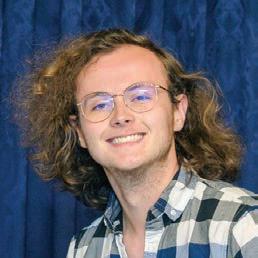
Buchanan Fellow and Music major Connor Prim, pictured above, received MTSU’s Community Service Award.
Emma Sutt, a Dance major, was selected as the inaugural recipient of the Jeff Whorley Endowment Scholarship.
Spanish major Emma Turner was awarded the Hanna Romans Witherspoon Scholarship, which supports junior or senior Honors students with financial need. Preference is given to students employed at the James E. Walker Library.
Miles Wine, a Public Writing and Rhetoric major, was selected as a recipient of the Dean’s Distinguished Essay Award for the 2025 issue of Scientia et Humanitas
English alumna Angela Benninghoff successfully defended her thesis and earned her master's from MTSU. She was also selected as a recipient of the Dean’s Distinguished Essay Award for the 2025 issue of Scientia et Humanitas. Benninghoff is now teaching English as an adjunct at Nashville State and Columbia State community colleges.

Rashieq Cockerham, pictured above, a Buchanan Fellow, was granted his commission as a second lieutenant in the U.S. Marine Corps after graduating in May with a degree in Biology. He also was awarded the Veteran Leadership Award and was selected as a recipient of the Dean’s Distinguished Essay Award for the 2025 issue of Scientia et Humanitas
Anna Collins, a 2024 Agribusiness graduate, was awarded the national Phi Kappa Phi Pioneer Award.
Claire Crowell, a 2008 Foreign Languages (French) graduate, was named president of A. Marshall Hospitality, which operates restaurants such as Puckett’s, Deacon’s New South, and Scout’s Pub. Crowell will spearhead strategic direction for the organization, which now has nearly 500 employees.
A May 2024 Honors College graduate with distinction, Antonio Dodson completed his Master of Accountancy in December 2024.
Hector Hernandez, a Buchanan Fellow who earned a Bachelor of Science degree in Mathematics in 2021, completed his Master of Education in the summer of 2025, also from MTSU.

Buchanan Transfer Fellow Deanna Lack, pictured above, who recently completed a double major in Religious Studies and Sociology, received a full-ride scholarship to the Methodist Theological School in Ohio.
Foreign Languages and Journalism double-major Zoe Naylor, who graduated in 2024, was named assistant city editor at the Columbia Missourian. She was a writer for MTSU’s Sidelines and is now pursuing her master’s in journalism at the University of Missouri.
Buchanan Fellow Katie Nicholson, a 2018 graduate with a degree in Music,
was named band director at Siegel High School, where she attended high school.
Kera Reynolds, a 2024 English graduate and Buchanan Transfer Fellow, received an internship through the Association of College and University Housing Officers as a summer assistant coordinator with Indiana University’s Residence Life for 2025. She is working toward a Master of Education at MTSU.
Zachary Thomas, a Buchanan Fellow and an Audio Production graduate in May, received MTSU’s Robert C. LaLance Jr. Achievement Award. He is now pursuing his master’s degree in Recording Arts and Technologies at the University.
A 2011 Honors alumna and History major, Sara Beth Urban was named president and CEO of the Tennessee Hospitality and Tourism Association. In this role, she is the powerhouse behind the state's lodging, dining, and tourism interests.

This little lamb, Llayna Ann Mitchell-Booher, was born Feb.18 to Stephen Mitchell and Honors alumna Rachel Booher. She has all the brightness and energy that her name encompasses, being taken from Greek origins meaning “light” or “torch.” Her parents pray this name, symbolizing illumination and positivity, will pave the way for a bright, fulfilling life full of light and love. Booher, who graduated in 2023 after studying Japanese, is now working on a master’s in English at MTSU.
Aleka Akoyunoglou Blackwell (English) published A Linguistic Guide to Sentence Structure in American English. The interactive ebook allows students to read the text of each chapter and engage with learning activities all within a single system. The text equips English teachers-in-training with grammatical knowledge and skills to instruct native and non-native English speakers of diverse linguistic backgrounds and levels of English mastery.
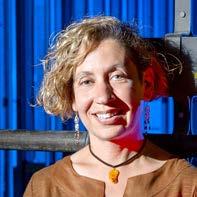
Claudia Barnett (English), pictured above, published Aristotle’s Wife: Six Short Plays About Women in Science Each play in this collection explores an imagined moment in the life of a little-known scientist sidelined by gender. Six brilliant women—Pythias of Assos, Susanna Lister, Cecilia PayneGaposchkin, Lise Meitner, Esther Lederberg, and Barbara McClintock— vibrantly inhabit these pages (and stages) at points where their personal and professional selves intersect.
Laura Clippard (Honors advisor and undergraduate fellowships specialist) presented “Demystifying JET and MEXT: A Guide for New Advisors” at the National Association of Fellowships Advisors biennial conference in Washington, D.C.
The SEASECS has awarded Bridget Donnelly (English) the 2025 Martha F. Bowden Teaching Prize for Eighteenth-Century Studies. Her innovative course had students collaborate on a critical edition of The Abbey of Clugny, an 18th-century novel by Elizabeth Meeke. Developed with the help of four students funded through MTSU’s Undergraduate Research Experience and Creative Activity (URECA) program—Brittany Eidemiller, Karsen Gray, Heather Sandefur, and Brynlee Wolfe—the project is set to be published in Routledge’s Chawton House Library: Women’s Novels series.
Ron Kates (English) was selected for the Faculty Student Success Award for 2025 from the College of Liberal Arts.

Robin E. Lee (Honors strategic communications specialist), pictured above, co-presented “Culture and Community in Harmony: Elevating Multiple Sources of Identity in Scholarship Personal Statements” at the annual National Collegiate Honors Council conference in Kansas City.
Collin McDonald (Aerospace), a former Buchanan Fellow, was awarded a Distinguished Instructor Award through the Aircraft Owners and Pilots Association Foundation. He is also the 2025 recipient of the King Schools/National Association of Flight Instructors Flight Scholarship, providing him with $5,000 to further his flight instructor training and lifetime access to King Schools’ extensive course library and to Flight Instructor Refresher Courses.
Joan McRae (World Languages, Literatures, and Cultures) received two nationally recognized honors last fall. In early October, she landed a $121,000 grant from the National Endowment for the Humanities. The French language professor also received the National Online Teaching Award from the Distance Learning Special Interest Group of the American Council on Teaching of Foreign Languages.

Tom Neff (Video and Film Production), pictured above, completed a documentary titled Clemmie G.: Unfiltered about Clemmie Greenlee
and her transformation from abused street addict to selfless champion of youths on the street and of mothers whose sons have been senselessly murdered by street violence. A preview screening took place at Nashville’s Belcourt Theatre.
Nancy Prescott (Honors student engagement coordinator) and Dianna Rust (University College) were presented with statewide Harold Love Outstanding Community Service Awards. Rust, with over 30 years of experience in higher education, is the coordinator for MTSU’s Integrated Studies and Professional Studies programs. Prescott has significantly promoted civic learning on campus.
Kevin E. Smith an Honors faculty member and Anthropology professor, died at age 61 on March 14, 2025. Smith won many awards over his career, focusing on African and Native American archaeology and anthropology. He also co-authored a book, founded the electronic journal Tennessee Archaeology, served on the governor’s Archaeological Advisory Council and State Review Board, and published numerous peer-reviewed research papers. In 2017, Smith won the prestigious Career Achievement Award from MTSU for his work and service to the Blue Raider community. In 2024, the Southeastern Archaeology Association annual conference featured lectures on his work and presented him with a lifetime achievement award.
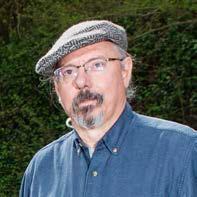
The Honors College deeply appreciates friends who have contributed to its success in countless ways. Philanthropic support has been integral to the college’s history, most notably through the construction of our beautiful building. We are honored to recognize those who made giving to the college a priority in 2024–25.
Simale Abadula
Judy and Mohammed Albakry
Arianna Alvarez
Ascend Federal Credit Union
Donald Ray and Rita Ash
Rosemary Bates
Katherine Bogale and Bryan Podzius
Kirsten and Matthew Bowland
Sylvester and Semanthie Brooks
Julie Brymer
Sandra and David Campbell
Cynthia Carlton
Charities Aid Foundation of America, on behalf of Andy Womack
Christopher and Gloria Ciecka
Douglas and Karen Cole
Anna Joyce Collins
Katherine Crytzer and Joseph Oliveri
Nancy and Bobby Cummins
Rodd and Rebecca Daigle
Carter Elliott
Katie Enzor
Mary Evins
Fidelity Charitable
Tia Floyd
Barry and Debra Gidcomb
The Andrew Goodman Foundation Inc.
Eric Guyes, in memory of Rita Guyes
Johari Hamilton
Minda Harrell
Carla and Robert Hay
Raiko and John Henderson
Matthew Hibdon
Mary Elizabeth Hill, in honor of Jacob
Erin Marsh
Brian and Rebekah Hoffpauir
Kimberly and Robin Hundley
Bruce and Alice Huskey
The Jennings and Rebecca Jones Foundation Inc.
Faye and Gary Johnson
Stephen Jones
Beverly Keel
Rebekka King
Robert and Katherine
Daniel Knies
Amy Lauerhass
Betsy and Chase Ledbetter
Robin Lee
Jacob Li
Allen Lloyd
Marilyn and Philip Mathis
June McCash
David and Lorrie McDonald
Joan McRae Kleinlein
Don and Carolyn Midgett
George and Kim Murphy
Robert and Michiko Petersen
Philip Phillips and Sharmilla Patel
Pinnacle
Financial Partners
Judy Powell
Marsha Powers
Mitch Pryor
Azim and Salina
Khan Razzaq
Jerry Roberts
Dianna and Mark Rust
Andrew Sheets
Bill and Christine Smalley, via Blackbaud
Giving Fund, Jackson National Life Insurance
Jarron Springer, Greater Nashville Realtors Inc.
Royce and Susan Taylor
Cynthia Torres
Susan Trammell
George and Roxanne Vernardakis
John and Linda Vile
Nathan Wahl
Jeff Whorley
Vincent and Stacey Windrow
James and Hanna
Romans Witherspoon
Andy and Cheryle Womack
Jennifer Woody
Paul Wydra

The Honors College is raising funds to support educational enhancement opportunities for our talented students, particularly scholarships, study abroad, student research and travel to conferences, and Honors publications.
Please consider making a tax-deductible gift.
• To make a gift online, go to mtsu.edu/supporthonors
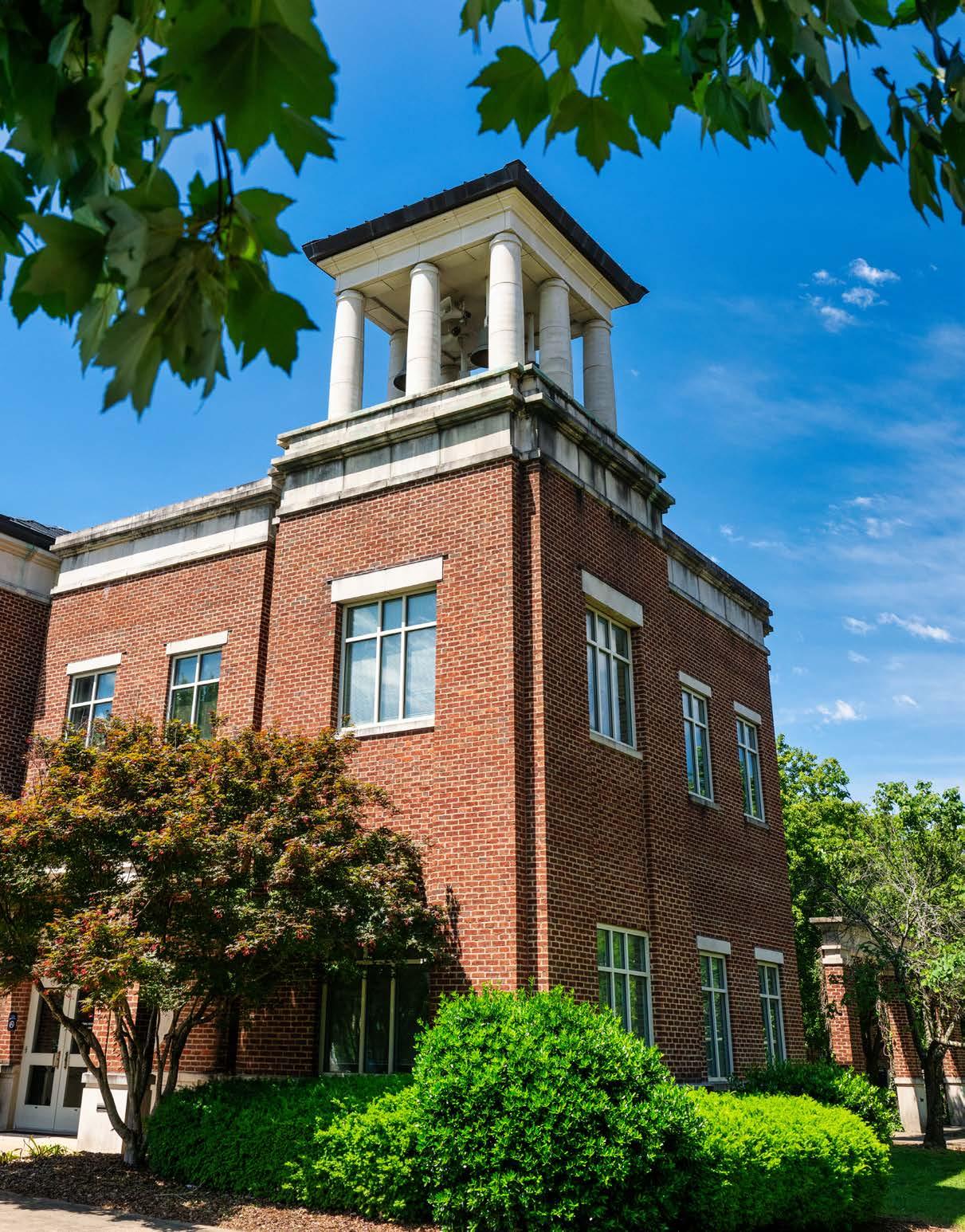

• To make a gift by mail, please make your check payable to MTSU Honors College and send it to: Middle Tennessee State University Development Office 1301 E. Main St. MTSU Box 109 Murfreesboro, TN 37132
Thank you in advance for your support!
Areté Magazine

by J. Intintoli